
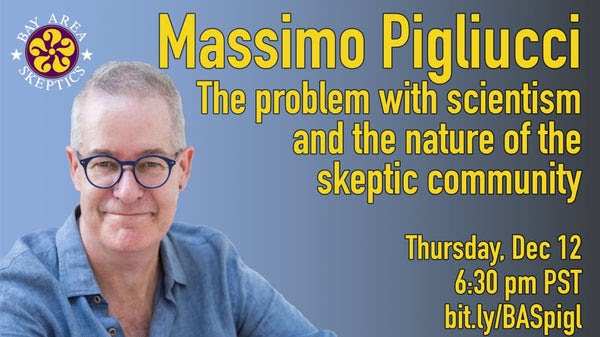
We live in times of increased distrust of science, which has real consequences in terms of people’s quality of life and health, not to mention, potentially, in terms of the very future of the human ecosystem. So this is surely not a good time to criticize science itself, right? Well, the problem with critical thinking is that it is supposed to be applied universally, including to science itself. Instead, some well-known science popularizers, and even skeptics, act like uncritical cheerleaders, thus undermining that very confidence in science they so cherish and rightly encourage. Let’s talk about it, shall we?
WHO: Massimo Pigliucci is an author, blogger, podcaster, as well as the K.D. Irani Professor of Philosophy at the City College of New York. His academic work is in evolutionary biology, philosophy of science, the nature of pseudoscience, and practical philosophy. Massimo publishes a regular column in Philosophy Now entitled “The Art of Living.” His books include How to Be a Stoic: Using Ancient Philosophy to Live a Modern Life (Basic Books) and Nonsense on Stilts: How to Tell Science from Bunk (University of Chicago Press). He is the former host of the Rationally Speaking podcast, and is a frequent contributor to the Skeptical Inquirer. Massimo’s new book is Beyond Stoicism: A Guide to the Good Life with Stoics, Skeptics, Epicureans, and Other Ancient Philosophers (with Greg Lopez and Meredith Kunz, The Experiment). More by Massimo at https://massimopigliucci.org and https://thephilosophygarden.substack.com.
WHEN: 12 December 2024
HOW: Click HERE

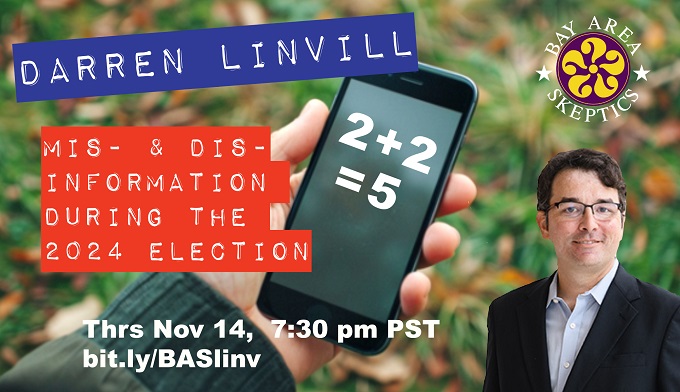
WHAT: Mis- and dis-information during the 2024 election
The 2024 election was notable for its continuation of high amounts of dis-information that were spread through a variety of means. There were efforts by foreign agents to influence our elections and throw sand in the gears of our electoral machine. Perhaps predictably, the use of AI in election interference has increased with the availability of sophisticated large language models. This presentation will address several specific campaigns, how they operated, and what (if any) influence they may have had.
WHO: Darren Linvill is a professor in the Clemson University Department of Communication and co-director of the Watt Family Innovation Center’s Media Forensics Hub at the same institution. He has written and researched extensively about the strategy and tactics of foreign influence operations, with a focus on the work China and Russia engage in through social media. He has partnered with organizations including CNN, NBC, NPR, ProPublica and the BBC to uncover foreign operations targeting the U.S. and the West. Beyond his academic work, Darren has written for outlets including The Washington Post, Rolling Stone, Foreign Affairs, and Lawfare.
WHEN: Thursday 14 November 2024
HOW: Online. Click HERE

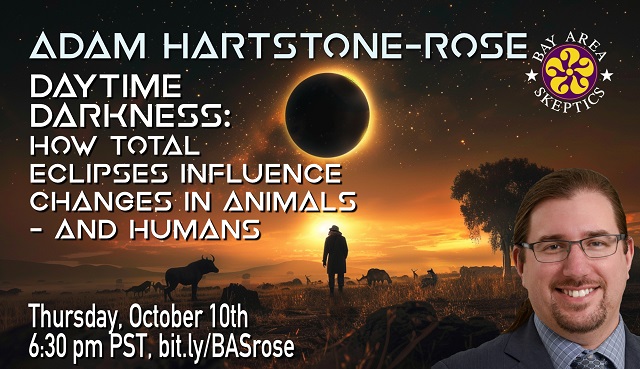
WHAT: Daytime Darkness: How Total Eclipses Influence Changes in Animals – and Humans
Because a total solar eclipse occurs in any given location only about once every 375 years, experiencing an eclipse is a once-in-a-lifetime event for most of us, and even more so for most other animals. There is surprisingly little published about the effects of eclipses on people and other animals. But the US was lucky enough to experience two transcontinental total solar eclipses in relatively rapid succession in 2017 and in April of 2024. In 2017, my team studied animal reactions to this bizarre event, and we expanded that work for the 2024 eclipse during which we had hundreds of participatory scientists along its path making observations not only of how animals responded to the eclipse but how the eclipse itself, and participating in this research, influenced their own feelings of awe and affinity toward science. Thus, we have an amazing opportunity to discuss a phenomenon that we now know to be literally awesome!
WHO: Adam Hartstone-Rose, Professor of Biological Sciences at North Carolina State University, studies functional morphology and comparative anatomy, mostly of primates and carnivores: how are animals adapted to do what they do? His lab examines the relationship between anatomical form and behavioral functions – especially the relationship between diet and the masticatory apparatus (jaws, teeth and masticatory muscles). They do this through studies of animal behavior (e.g., feeding experiments), soft-tissue muscle dissections and analysis, and examination of the skulls and teeth of both living and extinct species. Beyond morphological research, lab members conduct research on animal responses to eclipses and the psychological effect of participating in that research on participating scientists. The laboratory’s psychology research is part of a larger emphasis focusing on broadening participation in STEM by people from groups that have been historically underrepresented in science.
WHEN: Thursday October 10, 2024
HOW: Online. Click HERE

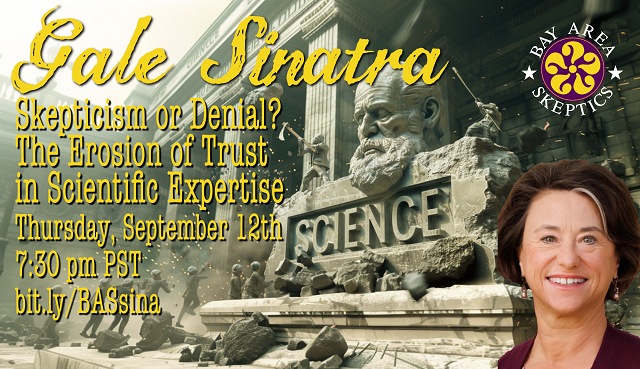
WHAT: Skepticism or Denial? The Erosion of Trust in Scientific Expertise
How do individuals decide whether to get vaccinated, consume genetically modified foods, or vote to support climate change mitigation efforts in their neighborhood? Democracies depend on educated citizens who can make informed decisions about scientific issues. In, Science Denial: Why It Happens and What to Do About It, Sinatra and co-author Barbara Hofer examine the psychological factors contributing to science denial, doubt, and resistance. The themes from the book including the role of psychological constructs such as misconceptions, cognitive biases, emotions, identity, epistemic cognition, and motivated reasoning in (mis)understanding science. This presentation will focus on how skepticism, a cornerstone scientific value, can lead some to mistrust, doubt, and denial of consensus science and what this means for the health and wellbeing of the people and the planet.
WHO: Dr. Gale M. Sinatra is the Stephen H. Crocker Chair and Distinguished Professor of Psychology and Education at the Rossier School of Education at the University of Southern California. She received her B.S., M.S., and Ph.D. in Psychology from the University of Massachusetts, Amherst.
Sinatra heads the Motivated Change Research Lab at USC, the mission of which is understanding the cognitive, motivational, and emotional processes that lead to attitude change, conceptual change, and successful STEM learning. Her co-authored book with Dr. Barbara Hofer, a psychologist of Middlebury College in Vermont is entitled: Science Denial: Why it Happens and What to Do About It (2021, Oxford University Press).
WHEN: Thursday 12 September 2024
HOW: Online. Click HERE

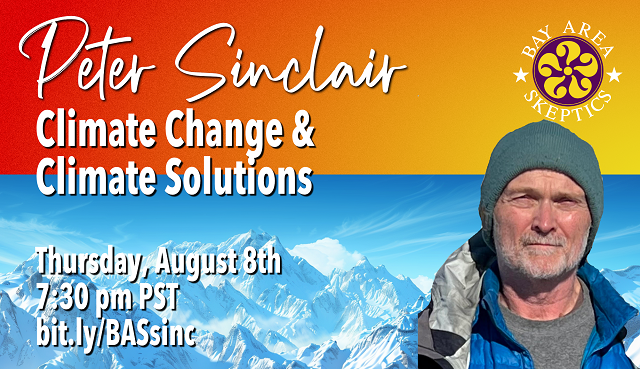 WHAT: Climate Change and Climate Solutions
WHAT: Climate Change and Climate Solutions
What Does Climate Science tell us about the current extraordinary year of extremes? Where are we in deploying Climate solutions?
WHO: Peter Sinclair is a Videographer, specializing in environmental and renewable energy issues, based in Midland, Michigan. His YouTube video series, “Climate Denial Crock of the Week”, the blog of the same name, and “This is Not Cool”, a collaboration with Yale Climate Connections – have received millions of views, are used in higher education and university settings around the planet, and have become trusted resources for scientists, educators, students, policy makers, and citizens. He has been called “The sharpest climate denial debunker on YouTube” and “The most important videographer on the planet.”
Mr. Sinclair has interviewed, worked with, traveled with, and learned from hundreds of the world’s leading scientists and engineers. As Media director of the Dark Snow Project, an international crowd-funded science communication initiative, Mr. Sinclair has traveled many times to the Greenland Ice Sheet, embedded with scientific teams. His videos are internationally recognized by experts, and have established Mr. Sinclair as a frequent presenter on climate, renewable energy, and science communication. In 2017, the National Center for Science Education recognized Mr. Sinclair as a “Friend of the Planet”. For more scripts, comments, and links to his sites, visit https://thinc.blog/about/
WHEN: Thursday August 8, 2024
HOW: Online. Click HERE

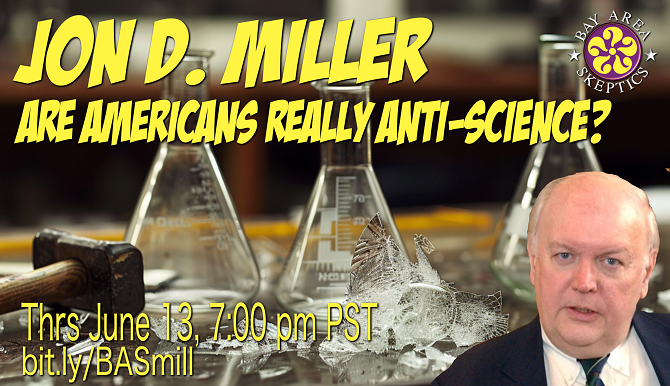
WHAT: Are Americans Really Anti-Science?
Lately, there has been much discussion in the media and even in academic journals about the supposed rise of “anti-science” in the United States. Examples tend focus on climate change, evolution, and vaccination. But what about science in general? Are Americans truly anti-science in the sense of rejecting all of science? Research shows that in the decades since the end of the Second World War, American adults actually have held strong positive attitudes about the benefits of science and technology and fewer concerns or reservations about science and technology broadly. I will discuss the reasons for this general approval of science. Looking to the future, I will discuss the challenges in the 21st century to maintaining strong positive attitudes toward science and increasing the level of civic scientific literacy in the U.S. and similar industrial countries.
WHO: Jon D. Miller is Director of the International Center for the Advancement of Scientific Literacy in the Institute for Social Research at the University of Michigan. He is also Director of the Longitudinal Study of American Youth (LSAY). Jon Miller has measured the public understanding of science and technology in the United States and the factors associated with the development of attitudes toward science for the last three decades. He pioneered the measurement of scientific literacy and his approach to the public understanding of science has been replicated in more than 40 countries. He has published four books:
Citizenship in an Age of Science (Pergamon Press, 1980)
The American People and Science Policy (Pergamon Press, 1983)
Public Perceptions of Science and Technology: A comparative study of the European Union, the United States, Japan, and Canada (Foundation BBV, Madrid, 1997)
Biomedical Communications: Purposes, audiences, and strategies (Academic Press, 2001)
— and more than 60 journal articles and book chapters. He is a member of the editorial boards of the journals Public Understanding of Science (Sage) and Science Popularization (Beijing). Jon is a Fellow of the American Association for the Advancement of Science, served as a Sigma Xi national lecturer, is a member of Phi Beta Kappa, and is a member of the Board of Directors of the Chicago Council on Science and Technology. He retired from full-time service in July, 2021, and is a Research Scientist Emeritus at the University of Michigan.
His Wikipedia page can be found at: https://en.wikipedia.org/wiki/Jon_D._Miller
WHEN: Thursday 13 June 2024
WHERE: Online. Click HERE

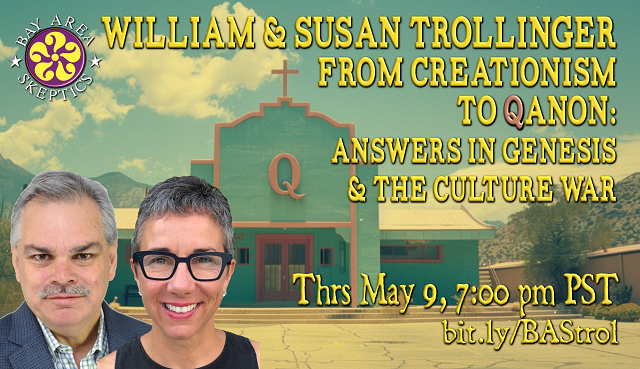
WHAT: From Creationism to QAnon: Answers in Genesis and the Culture War
Our book, Righting America at the Creation Museum, came out in 2016. In the intervening years, the creationist organization Answers in Genesis has opened Ark Encounter, remodeled the Creation Museum (in some places as a response to our book), opened a K-12 school, and dramatically expanded its online presence. At the same time, AiG has doubled down on the culture war rhetoric, dismissing climate change (or, as AiG CEO Ken Ham refers to it, “the climate cult”) as a hoax, rejecting the reality of a COVID-19 pandemic (in the process attacking vaccination mandates as oppressive), and working hard to appeal to QAnon devotees (to the point of opening the Ark to the filming of a QAnon video).
To expand on what we said in the “Introduction” to our book, all of us have a stake in understanding what is happening in the world of AiG – including the museum and the Ark – and its role in preparing and arming crusaders for the ongoing culture war that polarizes and poisons U.S. religion and politics. As bizarre as the world of AiG may seem to many Americans, what happens there matters to all of us.
WHO:
Susan Trollinger is Professor of English at the University of Dayton. She earned her Ph.D. in Rhetoric from the University of Pittsburgh, and is the author of Selling the Amish: The Tourism of Nostalgia (Johns Hopkins, 2012).
William Trollinger is Professor of History and Religious Studies at the University of Dayton. He earned his Ph.D. in History from the University of Wisconsin-Madison, and is the author of God’s Empire: William Bell Riley and the Making of American Fundamentalism (2nd ed., Tennessee, 2025).
The Trollingers have co-written, among other publications:
Righting America at the Creation Museum (Johns Hopkins, 2016)
“Creationism,” Oxford Handbook of Christian Fundamentalism (Oxford, 2023)
“The Bible and Creationism,” Oxford Handbook of the Bible (Oxford, 2017)
and
“From Creationism to QAnon: The Culture War Conspiracism of Answers in Genesis,” which will appear in Isis in the summer of 2025, and from which this talk is taken.
WHEN: Thursday 9 May 2024
WHERE: Online. Click HERE

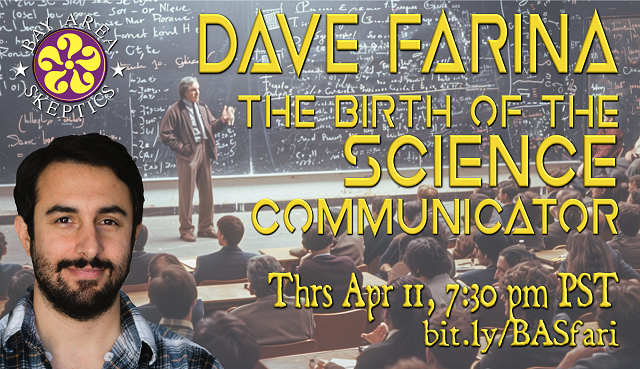
WHAT: The Birth of the Science Communicator
What is a science communicator? The era of once-a-decade outliers like Carl Sagan is long gone. In this current era of internet-borne disinformation and science denial pandemonium, science communication has emerged as a vibrant and painfully necessary field, with an army of science scholars focusing their expertise exclusively on informing the public. Charlatans and anti-science propaganda have never been more prevalent, and the stakes have never been higher, as the existential challenge of the 21st century begins to materialize: How do we help people know what is true? This talk will clarify the issue and players involved, as well as highlight important strategies that can be identified toward winning this war with ourselves.
WHO: Dave Farina is a science communicator and generalist best known for his YouTube channel, Professor Dave Explains (2.8M subscribers). While the channel is primarily a database of academic tutorials to help students with a variety of subjects, Dave is also passionate about neutralizing disinformation and science denial, from flat earthers and creationists, to anti-vaxxers and medical hoaxes. Dave hopes to serve as a beacon toward the rehabilitation of public science literacy.
WHEN: Thursday 11 April 2024
WHERE: Online. Click HERE

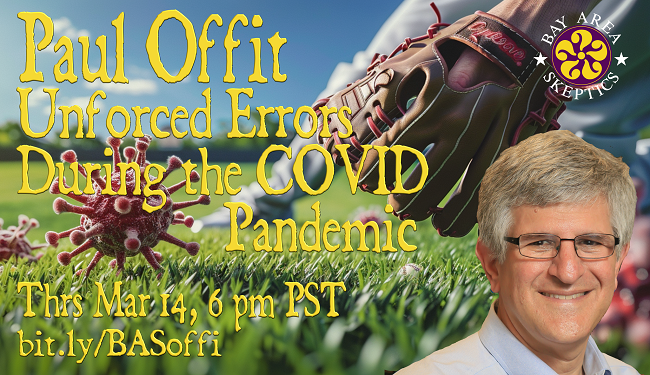
Paul Offit, MD
WHAT: Unforced Errors During the COVID Pandemic
Dr. Offit will discuss critical mistakes and issues that occurred during the COVID-19 pandemic.
WHO: Paul A. Offit, MD is the Director of the Vaccine Education Center at the Children’s Hospital of Philadelphia as well as the Maurice R. Hilleman Professor of Vaccinology and a Professor of Pediatrics at the Perelman School of Medicine at the University of Pennsylvania. He is currently a member of the FDA’s Vaccine Advisory Committee and the recipient of many awards. Dr. Offit has published more than 170 papers in medical and scientific journals in the areas of immune responses and vaccine safety.
WHEN: Thursday 14 March 2024
WHERE: Online. Click HERE

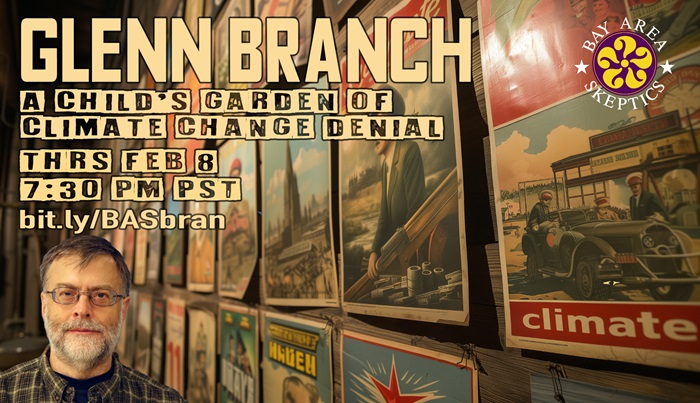
WHAT: A Child’s Garden of Climate Change Denial
Climate change denial propaganda campaigns aimed at American teachers and students are not new, but in 2023, no fewer than four — from the Heartland Institute, the CO2 Coalition, EverBright Media, and PragerU Kids — were in the headlines. Glenn Branch of the National Center for Science Education read all of the climate change denial propaganda, for his sins, and discussed the campaigns with journalists across the country and around the world. In his talk, he will assess these campaigns and their likely effects in the context of the advances of climate change education in the United States over the last decade.
WHO: Glenn Branch is deputy director of the National Center for Science Education, a nonprofit organization that defends the integrity of American science education against ideological interference. He is the author of numerous articles on climate education and evolution education, and obstacles to them, in such publications as Scientific American, American Educator, and The American Biology Teacher, and the co-editor, with Eugenie C. Scott, of Not in Our Classrooms: Why Intelligent Design is Wrong for Our Schools (2006).
WHEN: Thursday 8 February 2024
WHERE: Online. Click HERE

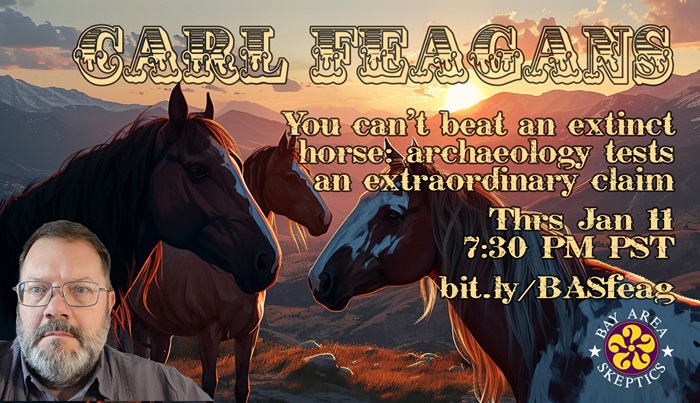
WHAT: You Can’t Beat an Extinct Horse
A November 2023 episode of Science Friday, an NPR show beloved by many, including myself, included a short episode dedicated to the environmental problems caused by wild horses on the landscape of the western United States. In this episode, the host presented the view of Yvette Running Horse Collin rejecting the standard archaeological/paleontological conclusions that horses evolved in North America, died out, and were reintroduced to Native Americans by the Spanish. Instead, she claims that horses never became extinct in North America, but existed continuously, and were domesticated by Native Americans before the advent of Europeans. SciFri appeared to give equal weight to her views and the standard model, which was referred to as “western science” – a phrase which itself is problematic. I’ll discuss Collin’s position – derived from her dissertation — through the lens of archaeology, and why her conclusions are based on poor or nonexistent data, and pseudoscientific assumptions.
WHO: Carl Feagans holds a masters degree in anthropology with a focus on archaeology from the University of Texas at Arlington. As an archaeologist, he’s worked both in the Pecos Canyonlands of South Texas and in Western Kentucky and Tennessee. He is currently an Assistant Heritage Program Manager and Archaeologist for the US Forest Service but has been writing about fake, fraudulent, and fantastic archaeology on his blog, The Archaeology Review, for over 15 years. Along with educating the public about the truth of pseudoarchaeology, Carl’s archaeological interests are in the history of iron production during the 19th century as well as the material record of moon-shining in Western Kentucky and Tennessee.
WHEN: Thursday 11 January 2024
WHERE: Online. Click HERE

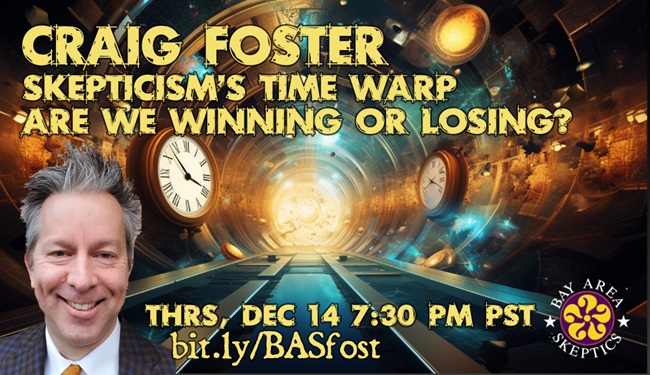
WHAT: Skepticism’s Time Warp. Are we winning or losing?
In my Skeptical Inquirer column, The Time Warp, I review early SI issues to examine skepticism with the knowledge provided by the passage of time. From one perspective, all skepticism does is win, win, win. From another perspective, all skepticism does is lose, lose, lose. How can today’s skeptics use this understanding to shape the future towards the winning side?
WHO: Dr. Craig Foster is the Director of Research and Evaluation for Northshore School District in Bothell, Washington. In that role, Dr. Foster is responsible for evaluating student development and for enhancing the development of students’ critical thinking. Dr. Foster was previously a psychology professor at the United States Air Force Academy and SUNY Cortland. Dr. Foster is a CSI Fellow and the author of The Time Warp column in Skeptical Inquirer.
WHEN: Thursday 14 December 2023
WHERE: Online. Click HERE

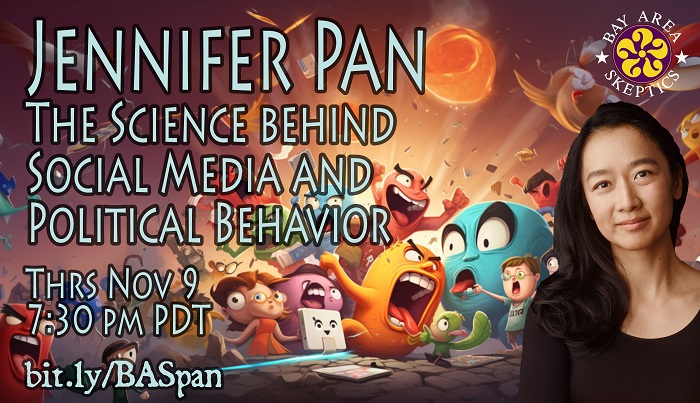
WHAT: The Science behind Social Media and Political Behavior
This talk introduces a collection of studies recently published in Science and Nature about the effects of algorithms and virality on political attitudes and behavior in the 2020 US election campaign. The findings are among the first published studies stemming from the most comprehensive research project to date examining the role of social media in American democracy. What are the effects of social media algorithms used by Facebook and Instagram in shaping users’ on-platform experiences as well as offline attitudes and behaviors?
WHO: Jennifer Pan is a political scientist whose research focuses on political communication, digital media, and authoritarian politics. She is the Sir Robert Ho Tung Professor of Chinese Studies, Professor of Communication and (by courtesy) Political Science, and a Senior Fellow at the Freeman Spogli Institute at Stanford University. Dr. Pan’s research uses experimental and computational methods with large-scale datasets on political activity to answer questions about the role of digital media in authoritarian and democratic politics, including how political censorship, propaganda, and information manipulation work in the digital age and how preferences and behaviors are shaped as a result.
WHEN: Thursday 9 November 2023
WHERE: Click HERE

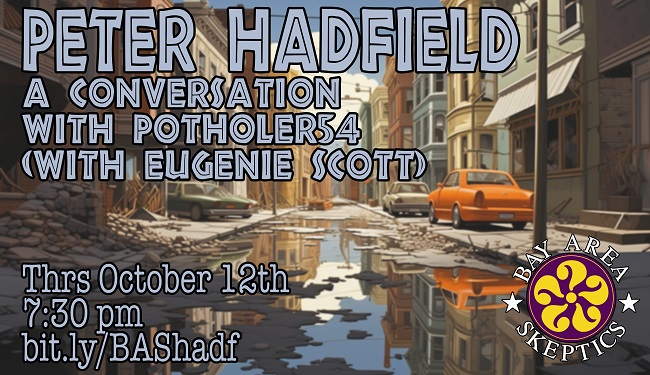
WHAT: Potholer54 discussion with Eugenie Scott
Join Bay Area Skeptics president Eugenie Scott in a wide-ranging conversation with science journalist and creator of the very popular skeptical YouTube channel, Potholer54. Through clips from the channel, Scott and Hadfield discuss his approach to his long-time production of science-related videos, and the importance of outreach to the public to encourage critical thinking and accurate scientific knowledge. With over 232,000 subscribers and over 32 million views, Potholer54 is one of the most popular YouTube science-related sites.
WHO: Peter Hadfield is a geologist by training, and a journalist by profession, a combination that is very amenable to analyses of “extraordinary claims”, as Carl Sagan termed them. Using both his science background and journalistic techniques of investigation and analysis, his videos are informative and lively. He became an overseas correspondent for the London Times, a columnist for the Daily Mail, and also a correspondent for New Scientist. He got into broadcasting from print journalism almost by accident, by happening to be in Tokyo’s Foreign Correspondents Club when Boston’s Monitor Radio called asking for someone for a Q&A and he picked up the phone. Monitor subsequently made him their Far East correspondent, and other media (such as CBC, NPR, BBC, and so forth), followed, and for several years he filed investigative stories from around the world. But he continued to file science stories with New Scientist, and write science-related stories for BBC, the Australian Broadcasting Company, and others, including USA Today, and US News and World Report, eventually adding the medium of television to radio for many of these outlets. He combined these media, scientific, and journalistic skills in his YouTube site, Potholer54, where he has provided the public with insightful analyses of numerous pseudoscientific claims that can loosely be grouped into categories like Creationism, Climate Change, Vaccines, COVID 19, and Pseudoarchaeology. With a touch of Monty Python….
WHEN: Thursday 12 October 2023
WHERE: Online. Click HERE to join.

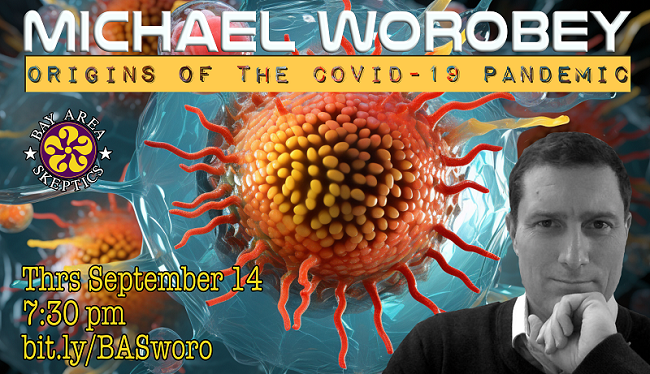
WHAT: Origins of the COVID-19 Pandemic
If we don’t understand the origins of SARS-CoV-2 and the COVID-19 pandemic, we won’t understand the risks that could lead to future viral emergence events and pandemics. I will discuss the multitude of scientific lines of evidence relevant to this topic, including epidemiological and evolutionary data. Analyses of these data reveal overwhelming evidence of a zoönotic origin.
WHO: Michael Worobey is a Professor and the Head of the Department of Ecology and Evolutionary Biology at the University of Arizona. Originally from British Columbia, he received his Ph.D. from the Department of Zoölogy at the University of Oxford, in 2001, where he was a Rhodes Scholar. He uses the genomes of viruses to trace the evolution of major communicable diseases and to understand their origins, emergence and control. He has made seminal discoveries pinpointing where, when and how HIV originated and spread worldwide, and how pandemics like the 1918 ‘Spanish flu’ and COVID-19 have emerged and killed large numbers of people. His work is regularly published in respected journals such as Nature and Science and is the subject of multiple books and films, including Spillover and Rise of the Killer Virus.
WHEN: Thursday 14 September 2023
WHERE: Online. Click HERE.

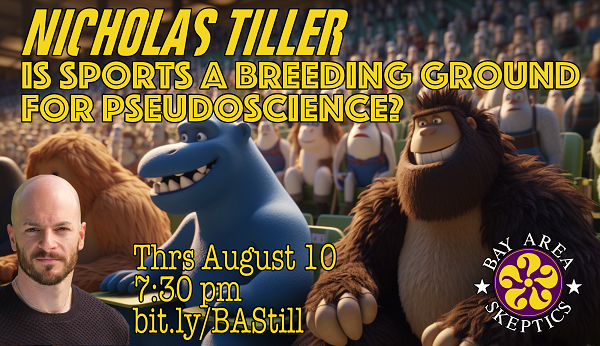
WHAT: Is Sports A Breeding Ground For Pseudoscience?
Success and failure in sport are distinguished by increasingly smaller margins. In their pursuit of performance, athletes and coaches have become ever more experimental, leaving no stone unturned. But blunted critical faculties and lax consumer regulations have created a sporting culture where pseudoscience can thrive; thousands of products and services flood the market, all claiming to improve performance or promote recovery. Some are underpinned by rigorous science, most are not. The problem is exacerbated by pervasive social media which exploits flaws in human cognition, offers disproportionate influence to anti-science ideologies, and facilitates the spread of mis- and disinformation. What are the implications of this unregulated commercialist culture? And what are the possible solutions? In this talk, Dr. Nick Tiller (Harbor-UCLA) reframes the sporting world through the critical lens of science. From chiropractic to cryotherapy, sports shoes to supplements, Tiller scrutinizes some of sport’s most popular products and practices, offering a treatise on how skepticism (not cynicism) can reform sport and exercise and possibly save the world.
WHO: Nicholas B. Tiller (Ph.D.) is a senior researcher in respiratory medicine and exercise physiology at Harbor-UCLA, and author of The Skeptic’s Guide To Sports Science which was named one of Book Authority’s “Best Sports Science Books Of All Time.” For over a decade, Tiller has been scrutinizing the health and fitness industry through a skeptical lens; a subject he explores as a regular guest on podcasts, radio, and television. Tiller is a columnist at Skeptical Inquirer (the official publication of the Committee For Skeptical Inquiry), a columnist at Ultra-Running Magazine, and an editor at the International Journal of Sports Nutrition and Exercise Metabolism.
WHEN: Thursday 10 August 2023
WHERE: Online. Click HERE.

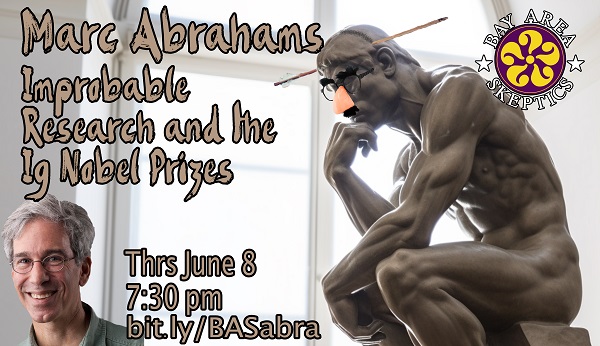
WHAT: Improbable Research and the Ig Nobel Prizes
The Ig Nobel Prizes honor achievements that make people LAUGH, then THINK. Ten new prizes have been awarded every year since 1991. The magazine Annals of Improbable Research organizes the Ig Nobel ceremony, which is held at Harvard University.
WHO: Marc Abrahams is the co-founder and editor of the magazine Annals of Improbable Research (AIR), and the author of This is Improbable, The Ig Nobel Prizes and other books. He edits and writes much of the website and blog www.improbable.com and the monthly newsletter mini-AIR. He also writes the weekly “Feedback” column in New Scientist. Before all of this, he was editor of the Journal of Improbable Results, and before THAT, a software engineer and before THAT, an applied mathematics graduate of Harvard, where he was a year behind Bill Gates. Unlike Gates, he finished college, although his software company was somewhat less successful.
WHEN: Thursday 8 June 2023
WHERE: Online. Click HERE.

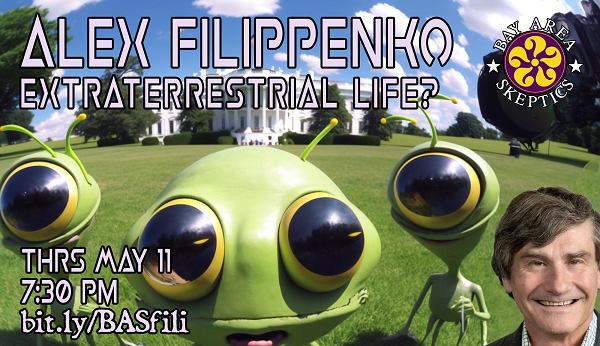
WHAT: Extraterrestrial Life? This talk will include a discussion of UFOs/UAPs and associated conspiracy theories, the strange object ‘Oumuamua, and more realistic ways of searching for extraterrestrial life. I’ll also share some of my thoughts on the likelihood of there being any other intelligent beings in our Milky Way Galaxy.
WHO: Alex Filippenko is a long-time friend of Bay Area Skeptics and is one of the world’s most highly cited astrophysicists. He is an elected member of both the National Academy of Sciences and the American Academy of Arts & Sciences, and an elected Fellow of the American Astronomical Society. His scientific accomplishments, documented in more than 1000 research papers, have been recognized with numerous prizes. He was the only person to have been a member of both teams that revealed the accelerating expansion of the Universe, a discovery that was honored with the 2011 Nobel Prize in Physics to the teams’ leaders, as well as the 2007 Gruber Cosmology Prize and the 2015 Breakthrough Prize in Fundamental Physics to all team members. Voted by students the “Best Professor” on the UC Berkeley campus a record 9 times, he was awarded the American Astronomical Society’s Education Prize in 2022. He has produced 5 astronomy video courses with The Great Courses, coauthored an award-winning astronomy textbook, and appears in more than 120 television documentaries.
WHEN: Thursday 11 May 2023
WHERE: Online. Click HERE.

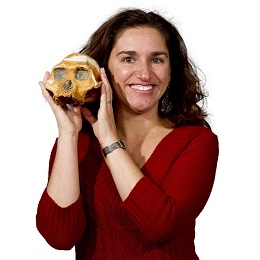
Briana Pobiner, Ph.D.
WHAT: The modern “paleo” diet movement makes many assumptions about what our ancient human ancestors ate. But are these assumptions based on actual evidence? Presenting a variety of lines of evidence for prehistoric human diets including early human, animal, and plant fossils, ancient stone tools, DNA, and living human and chimpanzee diets, Dr. Briana Pobiner will discuss significant changes in the evolution of human diets – and highlight what makes human meat-eating unique.
WHO: Briana Pobiner is a paleoanthropologist and educator in the Human Origins Program at the Smithsonian’s National Museum of Natural History. She conducts original scientific research on the evolution of Stone Age human diets, studying modern and fossil animal bones. She also leads the public engagement efforts of the Human Origins Program. In this capacity, she develops and facilitates public programs for various audiences, updates website content, responds to public and media inquiries, manages social media accounts, and leads training for exhibition volunteers. She joined NMNH in 2005 as a research fellow, and in 2008 she became a member of the core team for the Hall of Human Origins which opened in 2010. She is also an Associate Research Professor of Anthropology in the Center for the Advanced Study of Human Paleobiology at George Washington University, where she teaches undergraduate and graduate classes. Briana received a BA (1997) in Evolutionary Studies from Bryn Mawr College and an MA (2002) and PhD (2007) in Anthropology from Rutgers University.
WHEN: Thursday 13 April 2023
WHERE: Online. Click HERE.

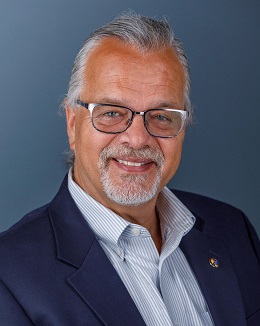
WHAT: Netflix, Apocalypses, and the Lost Civilization: Confronting Mainstream Pseudoarchaeology
The 2022 Netflix “docuseries” Ancient Apocalypse, hosted by former journalist and author Graham Hancock, has provoked a firestorm of discussion in the press and social media. In this series, the host claims that comets destroyed an advanced civilization that existed during the Ice Age and whose survivors were the progenitors of ancient complex societies around the world. Archaeologists contend that Hancock’s claims are a form of pseudoarchaeology that misrepresent science and revive Victorian-era explanations of the past that are associated with colonialism and notions of cultural superiority. Hancock’s attack on archaeology and archaeologists has been so dismissive that it prompted an open letter to Netflix from the Society for American Archaeology, outlining the potential harm to the profession in the minds of the public and alluding to the ways this series could contribute to issues of racism and white supremacy. The series is just one recent example of the rejection of academic expertise and the promotion of conspiracy theories about scientific authority. Hancock and his supporters complain that archaeologists are practicing “wokeism,” bringing the debate squarely into current culture wars that include the rejection of liberal higher education.
WHO: John W. Hoopes received his PhD in anthropology from Harvard University. He has been a professor on the faculty of the University of Kansas since 1989. Hoopes is an archaeologist who specializes in the archaeology of Latin America with a specific focus on pre-Hispanic cultures of the Isthmo-Colombian area. His interests include the origins of ceramic technology, gold metallurgy, and complex society. Hoopes recently co-edited two books for Dumbarton Oaks with the late Colin McEwan: Pre-Columbian Art from Central America and Colombia at Dumbarton Oaks and Pre-Columbian Central America, Colombia, and Ecuador: Toward an Integrated Approach. Hoopes has had a long-term engagement with pseudoarchaeology, having assisted Prof. Stephen Williams to develop the first course ever on this topic forty years ago as a graduate student at Harvard. He was a scholar and outspoken critic of the so-called Maya Apocalypse that did not occur on December 21, 2012, having published several peer-reviewed articles, including in the book 2012: The Counterculture Apocalypse (2011) and a special 2012 issue of the journal Archaeoastronomy. His skeptical commentary was featured in the 2017 book and documentary film Lost City of the Monkey God (2021), about an archaeological project in Honduras. In 2019 Hoopes edited a thematic issue of The SAA Archaeological Record, the official magazine of the Society for American Archaeology, titled “Pseudoarchaeology, Scholarship, and Popular Interests in the Past in the Present” that provided colleagues with a context for interpreting the work of Graham Hancock. As an active contributor to Wikipedia and discussions on social media, Hoopes’ interests have included Western esoterica and the occult, psychedelics and popular culture, and proactive critiques of pseudoscience and pseudoarchaeology. For the past four years, he has taught a seminar for first-year college students titled, “How to Find a Lost City.”
WHEN: Thursday 9 March 2023
WHERE: Online. Click HERE.

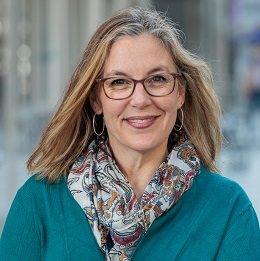
WHAT: The Cultural Logic of Vaccine Refusal
Healthcare decisions are deeply personal. Yet infectious disease reveals how our personal choices inevitably affect others. Drawing on more than a decade of research on why parents reject vaccines for their children, this talk examines perceptions of vaccines and how parents come to see vaccines as unnecessary or risky. Rather than seeing parents who reject vaccines as ignorant, anti-science, selfish, or delusional, I show how vaccine hesitancy and refusal are in many ways logical responses to the cultural pressures placed on parents. I conclude by considering why vaccines work best when used by a critical mass of people and how we might encourage a culture of shared responsibility that in turn could increase participation in public health interventions like immunization, and thus lead to healthier communities.
WHO: Jennifer Reich, Ph.D. is Professor of Sociology at the University of Colorado Denver. Her research examines how individuals and families weigh information and strategize their interactions with the state and service providers in the context of public policy, particularly as they relate to healthcare and welfare. She is author of two award-winning books, Fixing Families: Parents, Power, and the Child Welfare System and Calling the Shots: Why Parents Reject Vaccines, and is editor of the books, Reproduction and Society and State of Families, and the book series Health, Society and Inequality at NYU Press. Her work has been featured in many news outlets including the New York Times, the Washington Post, NPR, and Newsweek, and on the Netflix show, Bill Nye Saves the World.
WHEN: 9 February 2023
WHERE: Online. Click HERE.

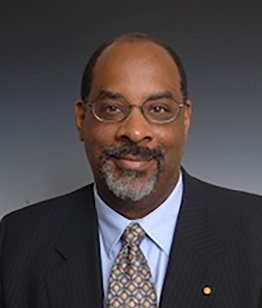
WHAT: Racism, Not Race: Answers to Questions Even a Skeptic Might Ask
Racism created race. The socially defined racial groups we currently experience did not result from an objective examination of human biological variation. This talk recounts the study of biological variation and its connection to race concepts within the Western world from its roots in Christian special creationism to modern evolutionary ideas. It will end with a discussion of why anti-racism in science is now more than ever necessary to improve the modern scientific enterprise.
WHO: Dr. Joseph Graves, Jr. received his Ph.D. in Environmental, Evolutionary and Systematic Biology from Wayne State University in 1988. In 1994 he was elected a Fellow of the Council of the American Association for the Advancement of Science (AAAS). In 2012, he was chosen as one of the “Sensational Sixty” commemorating 60 years of the NSF Graduate Research Fellowship Award. In 2017, he was listed as an “Outstanding Graduates” in Biology at Oberlin College; and was an “Innovator of the Year” in US Black Engineer Magazine.
His research in the evolutionary genomics of adaptation shapes our understanding of biological aging and bacterial responses to nanomaterials. He is presently Associate Director/co-PI of the Precision Microbiome Engineering (PreMiEr) Engineering Research Center of Excellence (Gen-4 ERC) funded by the National Science Foundation (2022—2027). His book on nanomaterials is entitled: Principles and Applications of Antimicrobial Nanomaterials, (Amsterdam NE: Elsevier), 2021.
His books on the biology of race are entitled: The Emperor’s New Clothes: Biological Theories of Race at the Millennium, Rutgers University Press, 2005 and The Race Myth: Why We Pretend Race Exists in America, Dutton Press, 2005; with Alan Goodman, Racism, Not Race: Answers to Frequently Asked Questions, Columbia University Press, 2021. Racism, Not Race was named by Kirkus Reviews as “One of the Best Non-Fiction 2021” and to its “Best Books About Being Black in America 2021”. Finally, his biopic work entitled, A Voice in the Wilderness: A Pioneering Biologist Explains How Evolution Can Help Us Solve Our Biggest Problems, (New York: Basic Books), 2022.
He leads programs addressing underrepresentation of minorities in science. He had aided underserved youth in Greensboro via the YMCA chess program. He has also served on the Racial Reconciliation and Justice Commission, and COVID Vaccination Task Fore of the Episcopal Diocese of North Carolina. He also served as the science advisor to the Chicago, New Brunswick, and Methodist of Ohio Theological Seminaries through the AAAS Dialogues of Science, Ethics, and Religion (DoSER) program.
WHEN: 12 January 2023
WHERE: Online. Click HERE.

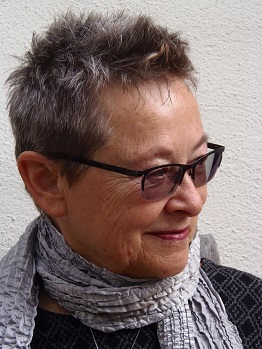
WHAT: Gods and Robots: Imagining Artificial Life in Antiquity
Who first imagined robots and Artificial Intelligence? Long before medieval automatons, even before self-moving machines were invented in antiquity, the concepts of replicating life were explored in Greek myths about Talos, Jason, Medea, Daedalus, Prometheus, Hephaestus, and Pandora. Drawing on her book, “Gods and Robots: Myths, Machines, and Ancient Dreams of Technology,” Mayor discusses the timeless quest for artificial life, to show how automatons, self-moving devices, and Artificial Intelligence were imagined in antiquity, and how the ancients grappled with still-unresolved ethical concerns about biotechne, “life through craft”
WHO: Adrienne Mayor a research scholar in the Classics Department and History and Philosophy of Science Program at Stanford University, is the author of:
- Flying Snakes and Griffin Claws
- Gods and Robots
- The Amazons: Lives and Legends of Warrior Women across the Ancient World
- The First Fossil Hunters: Dinosaurs, Mammoths and Myths in Greek and Roman Times
- Greek Fire, Poison Arrows & Scorpion Bombs: Unconventional Warfare in the Ancient World
- The Poison King: Mithradates, Rome’s Deadliest Enemy, a National Book Award finalist.
WHEN: 8 December 2022
WHERE: Online. Click HERE

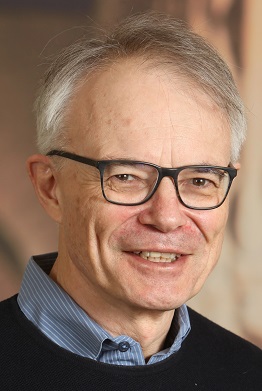
Jonathan Osborne, Ph.D.
WHAT: Science Education in an Age of Misinformation
How can science education improve young people’s ability to evaluate science-related claims? Online, young people are confronted with information of wildly varying quality made by those who would claim to have expertise. The complexity of science has made the key issue one of evaluating the credibility of the so-called “expert” rather than trying to evaluate the scientific claims per se. For this, what is needed is a combination of innovative basic skills of digital media literacy, and a good understanding of the “social practices” of science – the norms and values – which form the foundation of reliable knowledge. As does a fact-checker or journalist, the student should begin by looking for evidence that the source is independent, objective, trustworthy, and lacks a conflict of interest or ideological/political bias. Once past this test, students need an understanding of the social practices of science: the significance of consensus, the role of peer review, the importance of relevant scientific expertise, and the nature of uncertainty. Although much remains to be done to bring these ideas to the classroom, there are some extant models and curricula from both US and Finnish researchers that are being used successfully.
WHO: Jonathan Osborne is the Kamalachari Chair in Science Education, Emeritus in the Graduate School of Education, Stanford University (2009-). He started his career teaching high school physics and then moved to teacher training and research at King’s College London where he was appointed the Chair in Science Education in 2003. He was President of the US National Association for Research in Science Teaching (2006-7) and has won the Association’s award for the best research publication in the Journal of Research in Science Teaching twice (2003 and 2004) and the Distinguished Contribution to Science Education Award in 2018. He was a member of the US National Academies Panel that produced the Framework for K-12 Science Education. He chairs the expert group for the science assessments conducted by the OECD PISA Program in 2015 and 2025 when science is the primary focus and is the lead author of the report Science Education in an Age of Misinformation.
WHEN: Thursday 10 November 2022
WHERE: Online. Click HERE.

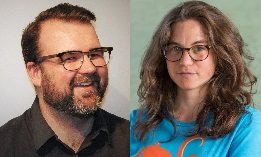
Sebastian Major & Wendy Zuckerman
WHAT: Science vs. … History?
A skeptical science podcaster and a skeptical history podcaster walk into a bar…. Following was a fascinating conversation asking big questions, like: What do good science and good history have in common? What makes a good science or history podcast, and how do two award-winning podcasters decide what skeptical topics to research? And what does the research process look like for such podcasts? A conversation moderated by Bay Area Skeptics’ Eugenie Scott.
WHO: Sebastian Major is the creator and host of Our Fake History, a podcast that explores historical myths and misconceptions. Sebastian looks at stories that people think are historical fact but may very well be elaborate fabrications. Did the Aztecs really think the Spanish conquistadors were gods? Was baseball really invented in one afternoon by a civil war hero? Our Fake History tries to determine what’s fact, what’s fiction, and what is such a good story it simply must be told. Our Fake History was recognized as the “Best Educational Podcast” at the 2018 Podcast Awards, and the show has been noted as one of Toronto’s “most addictive podcasts” by Toronto Life Magazine. Sebastian has been regularly featured on CBC Radio.
WHO: Wendy Zuckerman is an award-winning science journalist and podcaster. With her degree in Biomedical Science / Law (Hons) she’s reported on everything from gun control to octopus intelligence. Wendy started her career at New Scientist Magazine and went to the Australian Broadcasting Corporation, where she created the podcast Science Vs. In 2015, Wendy moved to New York to make Science Vs for Gimlet Media – where the show debuted at #1 in the US, Canada and Australia. Science Vs is now one of the top science podcasts in the world: featured in the The New York Times, LA Times, The Atlantic, and BBC. It won the 2020 AAAS Kavli Gold Prize for Coronavirus reporting. Zukerman recently was awarded Sigma Xi’s Honorary Membership Award “For presenting research results by speaking to scientists directly and taking on controversial topics directly through her podcast, Science Vs.
WHEN: Thursday 13 October 2022
WHERE: Online. Click HERE

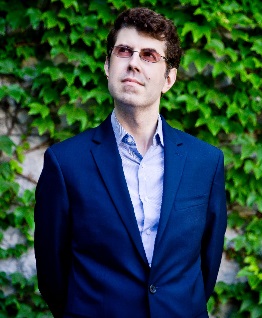
WHAT: How to Effectively Push Back Against Misinformation
Are we living in a post-truth world where facts no longer matter? Scientific research into “debunking” misinformation shows that there is still a place for facts. But when facts are not enough, what can we do? This talk will address fears of the backfire effect, as well as provide evidence-based recommendations on how best to push back against misinformation, using examples drawn from the ivermectin saga, Havana syndrome, and multiple chemical sensitivity.
WHO: Jonathan Jarry is a science communicator with McGill University’s Office for Science and Society, dedicated to separating sense from nonsense on the scientific stage. He has a Master’s degree in molecular biology and he brings his experience in cancer research, human genetics, rehabilitation research, and forensic biology to the work he does for the public. With cardiologist Dr. Christopher Labos, he co-hosts the award-winning medical podcast The Body of Evidence. He talks about science every Friday on CTV Montreal News and is regularly interviewed in both English- and French-language media.
WHEN: Thursday 8 September 2020
WHERE: Online. Click HERE.

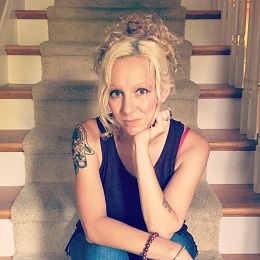
WHAT: What Does Evidence Do?
When it comes to evaluating claims, skeptics tend to adopt the well-known Sagan Standard: “Extraordinary claims require extraordinary evidence.” But what, exactly, is evidence? After all, conspiracy theorists and pseudoscientists often present a great deal of “evidence” for their claims. In fact, many conspiracy theorists themselves repeat Carl Sagan’s standard as a motto, believing that they do indeed possess extraordinary evidence. In this talk, I discuss different ways that the concept of evidence is used rhetorically in conspiracy claims. We will take a deep dive into what “evidence” means–and the work it does–for conspiracy theorists, as well as why “bad evidence” is often so persuasive.
WHO: Jenny Rice is Professor of Writing, Rhetoric, and Digital Studies at the University of Kentucky. She is the author of Awful Archives: Conspiracy Theory, Rhetoric, and Acts of Evidence. Her research focuses on public debates about “extraordinary claims,” including conspiracy theories, pseudoscience, and the paranormal.
WHEN: Thursday 11 August 2022
Where: Online. Click HERE.

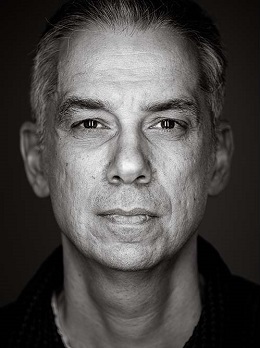
WHAT: How to Talk to a Science Denier – Conversations with Flat Earthers, Climate Deniers, and Others Who Defy Reason
It is sometimes claimed that trying to convince a science denier with facts will only backfire. The latest research, however, shows that this is mistaken and that there ARE effective techniques that can be used to keep someone from becoming a science denier and even help them to overturn mistaken beliefs once they are formed. The secret lies in recognizing that even empirical beliefs may be held for reasons that have nothing to do with evidence, such as personal values, trust, ideology, and group identity. The best way to convince someone in this case is not to insult them — or clobber them with evidence — but to engage in calm, respectful, patient conversation that simultaneously builds trust and encourages them to reflect not just on what they believe but the reasoning strategy that brought them to believe it.
WHO: Lee McIntyre is a Research Fellow at the Center for Philosophy and History of Science at Boston University. Formerly Executive Director of the Institute for Quantitative Social Science at Harvard University, he previously taught philosophy at Colgate University, Boston University, Simmons College, Tufts Experimental College and Harvard Extension School.
McIntyre is the bestselling author of POST-TRUTH (MIT Press, 2018) — which was named a Book-of-the-Week in April 2018 by CNN and a Best Book of 2018 by the PBS News Hour — along with thirteen other works of fiction and nonfiction, including DARK AGES: The Case for a Science of Human Behavior (2006), THE SCIENTIFIC ATTITUDE: Defending Science from Denial, Fraud, and Pseudoscience (2019), and his latest book HOW TO TALK TO A SCIENCE DENIER: Conversations with Flat Earthers, Climate Deniers, and Others Who Defy Reason (2021). His work has been translated into thirteen languages.
McIntyre’s popular essays have appeared in the New York Times, Washington Post, Boston Globe, Baltimore Sun, Nature, Newsweek, Scientific American, The Chronicle of Higher Education, and numerous other venues. He has appeared on CNN International on Amanpour and Company — and several other programs on PBS, NPR and the BBC — and has spoken at the United Nations, the Aspen Institute, and the Vatican.
In 2021, McIntyre starred in the docu-series INFODEMIC: Global Conversations on Science and Misinformation, broadcast on LINK TV and PBS.
WHEN: Thursday 9 June 2022
Where: Online. Click HERE

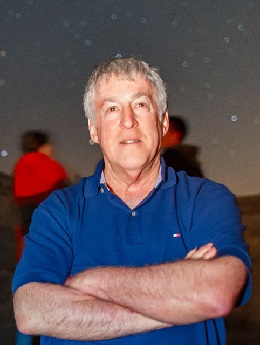
WHAT: Superstitions, Aliens, and Conspiracies: Tales from the Frontlines of Astronomy Outreach
Interest in astronomy and space is virtually universal. Knowledge is not. For me and legions of outreach astronomers I work with around the world, astronomy is the gateway to STEM education, accessible to all. But unlike other sciences, people rarely know the basics, like what a star or planet is, so astronomy outreach has to start with the ABCs. For some, aliens, conspiracies, and dogma have filled the knowledge gap before we encounter them. Many stories I hear are just shockingly poor interpretations of personal observations; lights in the sky are usually evidence of alien spacecraft (what is the opposite of Occam’s Razor?). Real science gets distorted, and ancient superstitions dominate in some cultures, like the harm a partially eclipsed Sun’s rays can do. For those lamenting the lack of scientific knowledge and critical thinking these days, welcome to my Universe.
WHO: Mike Simmons is a retired biomedical researcher at the School of Medicine at the University of California, Los Angeles (UCLA). Since retiring in 2005, he has turned largely to another passion, astronomy. Mike has been an amateur astronomer and outreach leader for more than 40 years and loves sharing the sky with others.
Mike’s outreach efforts in astronomy went international following a trip to Iran for the solar eclipse of 1999. Recognizing astronomy as a universal interest that transcends cultural differences, Mike founded Astronomers Without Borders in 2006 to unite astronomy and space enthusiasts worldwide through their common interests. He is currently an Affiliate Research Scientist at Blue Marble Space Institute of Science where he is creating programs addressing issues of diversity and inclusion using astronomy and space. He is a founding member of the Overview Institute, a member of the board directors of the International Dark-Sky Association, serves on the Outreach Committee of the African Astronomical Society and the IAU Working Group on Equity and Inclusion. He regularly gives presentations, both in the US and abroad, on using astronomy to improve international relations and reduce inequity.
Mike has received numerous awards for his work in the field, including having Minor Planet Simmons (22294) named in his honor in 2003. Mike was also awarded the prestigious 2014 Gabrielle and Camille Flammarion Prize from the Société Astronomique de France (SAF) for “setting a worldwide example that astronomy does transcend political and cultural borders.”
WHEN: Thursday 12 May 2022
Where: Online. Click HERE
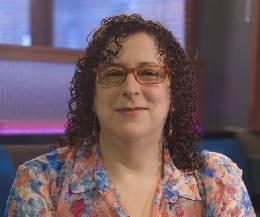
Margalit Fox
WHAT: The Confidence Men: How Two Prisoners of War Engineered the Most Remarkable Escape in History
Imprisoned in a remote Turkish POW camp during World War I, having survived a two-month forced march and a terrifying shootout in the desert, two British officers, Harry Jones and Cedric Hill, join forces to bamboozle their iron-fisted captors. To stave off despair and boredom, Jones takes a handmade Ouija board and fakes elaborate séances for his fellow prisoners. Word gets around, and one day an Ottoman official approaches Jones with a query: Could Jones contact the spirit world to find a vast treasure rumored to be buried nearby? Jones, a trained lawyer, and Hill, a brilliant magician, use the Ouija board—and their keen understanding of the psychology of deception—to build a trap for their captors that will ultimately lead them to freedom. A con game played for a good cause, the incident provides Fox an opportunity for reflections on the psychology of deception and how in the beginning of the 20th century, speaking to dead spirits seemed less implausible: the world was full of almost unbelievable miracles of magnetism, electricity, radio, and other wonders.
WHO: Margalit Fox originally trained as a cellist and a linguist before pursuing journalism. As a senior writer in The New York Times’s celebrated Obituary News Department, she wrote the front-page public sendoffs of some of the leading cultural figures of our age – including The Amazing Randi. Winner of the William Saroyan Prize for Literature and author of The Confidence Men and three previous books, Conan Doyle for the Defense, The Riddle of the Labyrinth, and Talking Hands, Fox lives in Manhattan with her husband, the writer and critic George Robinson.
WHEN: Thursday 14 April 2022
Where: Online. Click HERE
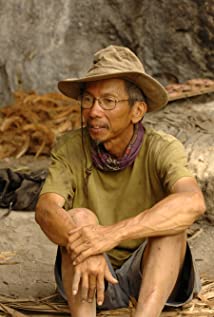
Yau-Man Chan
WHAT: The Reality of Reality TV
“Voted off the island”. “Will you accept this rose?” “You’re fired!” “Sashay away!” Reality TV has permeated American culture, and spread internationally as well. But what do we know about the behind-the-scenes world of reality TV? Yau-Man Chan was a fan favorite on two rounds of Survivor, and will tell what really goes on behind — and sometimes in front of – the cameras. How much is real and how much is staged?
WHO: Yau-Man Chan is a Malaysian-American living in the Bay Area. An MIT physics graduate, he worked for UC Berkeley as director of IT for the College of Chemistry until his retirement in 2013. A former board member of Bay Area Skeptics, he has spent much of his retirement running table tennis tournaments for the national table tennis organization (USATT) in the Bay Area. He also works part-time as a photographer and restores old photos and cameras. As one newspaper headline reported, “He lost a million, but won our hearts on Survivor”
WHEN: Thursday 10 March 2022
WHERE: Online. Click HERE
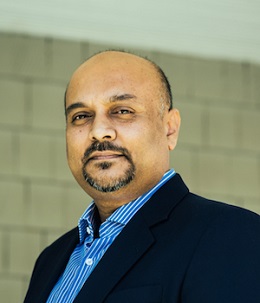
Yudhijit Bhattacharjee
WHAT: Who’s Making All Those Scam Calls?
Everyone has experienced the call. “This is Alex from the credit card company. We have a refund we want to give you that has to be deposited directly into your bank account. What is your bank account number?” or words to that effect. Or maybe “Alex” (or “Vicki”, or “Josh”) has bad news: your credit rating will plummet if you don’t send his/her company $200 immediately. What’s your credit card number? Calls like this bilk tens of thousands of people – many of them elderly – out of billions of dollars every year. What happens when a reporter traces one of these calls back to its source – in this case, to an Indian boiler room – with the assistance of a Brit hacker. Who is making all those scam calls, anyway, and what’s their story?
WHO: Yudhijit Bhattacharjee is a prize-winning reporter who worked for Science magazine until 2014. A contributing writer to the New York Times, the New Yorker, National Geographic, The Guardian, and other publications. A one-time crime reporter, he has long been interested in scams and frauds. His best-selling spy thriller, The Spy Who Couldn’t Spell, was described as “telling a story that would make a kickass movie”. It has, in fact, been optioned by Hollywood.
WHEN: Thursday 10 February 2022
Where: Online. Click HERE
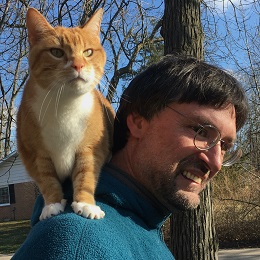
Taner Edis, Ph.D. & friend
WHAT: Weirdness!: What Fake Science and the Paranormal Tell Us about the Nature of Science
Skeptics usually approach fake science armed with a diagnostic checklist, asking whether the claims in question are falsifiable, naturalistic, parsimonious, and so forth. Philosophers of science, however, have long pointed out that fake sciences need not exhibit such features. Creationist claims, for example, are very often false, not unfalsifiable. Moreover, legitimate science can also fail skeptical tests. A better way to understand fake science is to shift our focus to institutions alongside psychological vulnerabilities and intellectual bad practices. Creationism is, again, a good example: its success depends on institutions that produce apologetics and promote loyalty rather than a process of learning. The work that skeptics do remains valuable, but we can do even better if we pay more attention to institutions and treat our favorite diagnostic criteria as warning signs rather than rigid rules.
WHO: Taner Edis, Ph.D. is professor of physics at Truman State University, where he regularly teaches a course, “Weird Science,” that explores fake science and the paranormal. His latest book, Weirdness! What Fake Science and the Paranormal Tell Us about the Nature of Science, was published in November 2021.
WHEN: Thursday 13 January 2022
WHERE: Online. Click HERE.
![]()
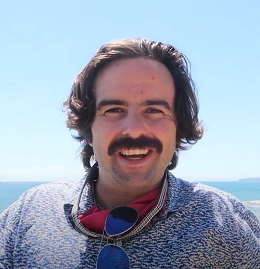
A.J. White
WHAT: Dangers of the “Lost Civilization” Trope
Archaeological finds are often interpreted in popular science through the ‘lost civilization’ trope: once great metropolises and their people that mysteriously vanished in history. Although ruins suggest the abandonment of a specific location at a point in time, they do not suggest that its occupants and their culture disappeared; most often people simply moved somewhere else for a variety of reasons and their descendants and culture exist to this day in some form. By labelling a people as ‘lost’ in the past we erase or minimize their descendants and culture in the present. This talk focuses on Cahokia, one of the most frequently mentioned ‘lost civilizations’ in the world, and its post-abandonment history.
WHO: A.J. White is a PhD candidate in the Department of Anthropology at UC Berkeley. He holds a M.S. in geology from Long Beach State University and is chiefly interested in intersections of climate change and cultural change in the past. His methodological focus is the use of human fecal biomarkers to link archaeological and paleoclimatic data. He enjoys walking with his wife, son, and dog and making videos about local history and science.
WHEN: Thursday 9 December 2021
WHERE: Online. Click HERE
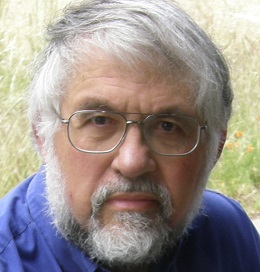
John Mashey
WHAT: Machineries of Doubt: Climate, Cigarettes & Confusion
Well-informed skepticism is crucial, especially in an era of Internet-amplified mis/disinformation often employed to create doubts about well-established science. That was famously the case with Big Tobacco’s use of PR agencies, front groups and think tanks, but climate doubt creation turns out to use the same tactics and often the same people. This talk examines the organized structure, tactics and groups who abuse good skepticism to manufacture doubt about science. Some call themselves “skeptics” on climate science, in abuse of the term, as they are really “pseudoskeptics.” If anyone saw the recent SkepTalks by Mark Boslough and John Cook (both long-time friends), this talk is related, but focuses on other areas than theirs, so should have minimal overlap.
WHO: John Mashey received his PhD in Computer Science from the Pennsylvania State University, spent 10 years at Bell Laboratories working on Unix and related software, and then moved to Silicon Valley in 1983. In the 1990s he was helping design supercomputers and helping sell them to customers like climate modelers, ending as VP and Chief Scientist at Silicon Graphics. He is a recipient of the USENIX Lifetime Achievement Award, and Pennsylvania State University’s Outstanding Alumni Award for Engineering and Computer Science, and is credited with originating the term and concept Big Data in the 1990s. After semi-retiring in 2001, he got interested in climate science and eventually became involved in defending climate science and climate scientists, and investigating organized denialism of human-caused climate change, on which he has often written. A long-time skeptic, he has written for Skeptical Inquirer, and is a CSI Scientific and Technical Consultant. He has been since 2013 a Member of UCSF’s Center for Tobacco Control Research and Education, one of whose offshoots is the Industry Documents Library, an insightful repository which started with tobacco documents, but has since added Chemical, Drug, Food and Fossil Fuels sections. He blogs at www.desmog.com, and is a trustee of the Computer History Museum.
https://en.wikipedia.org/wiki/John_Mashey
WHEN: Thursday 11 November 7:30PM
WHERE: Online. Click HERE
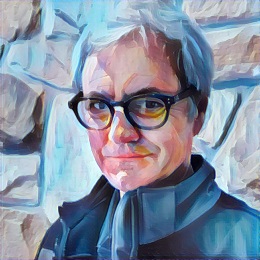
Richard Saunders
WHAT: Que Sera, Sera. Is the future ours to see? The Great Australian Psychic Prediction Project.
For more than 10 years, Richard Saunders has been compiling and researching psychic predictions made in Australia covering the years 2000 to 2020. With over 3000 predictions in the database, what conclusions can we draw about those who claim to be able to see into the future? How many of the thousands of predictions turned out to be on the money, how many were too vague to score and how many were just plain wrong? This talk will also detail the work of Richard’s online team of researchers from around the world, including the Bay Area, who have for over a year met each week to pour over and mark the predictions. A sneak-peek into the results of the project before official publication.
WHO: Richard Saunders lives in Sydney, starred as the “Skeptical Judge” on two seasons of the TV show “The One: The Search for Australia’s Most Gifted Psychic.” He is also the host of the weekly podcast “The Skeptic Zone,” now in its 14th year. Richard is also an origami expert, children’s author, CSI Fellow, and life member of Australian Skeptics.
WHEN: 7:30PM Thursday 9 September 2021
WHERE: Online. Click HERE
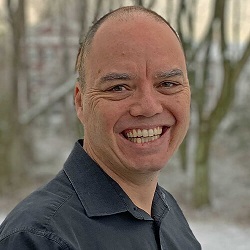
John Cook, Ph.D.
WHAT: What To Do About Misinformation (in Four Dimensions)
Misinformation is a complex problem pervading many aspects of society, with technological, psychological, social, and cultural aspects. Countering misinformation requires tackling the many-headed beast from a variety of disciplines and directions. The 4D Project synthesizes four research themes: Detect, Deconstruct, Debunk, and Deploy. Detection involves training machine learning models, in collaboration with UK-based political scientists, to automatically detect and categorize climate misinformation in real-time. Deconstruction uses a critical thinking methodology developed with University of Queensland philosophers to analyse and identify reasoning fallacies in misinformation. Debunking can take a variety of forms, and Cook will outline his collaboration with US-based communication researchers to experimentally test different approaches and improve psychological understanding of misinformation correction. Deployment involves putting into practice the theoretical insights from the first three themes. For example, the Cranky Uncle game, developed with the U.S. creative agency Autonomy, combines critical thinking, inoculation theory, and cartoons in the form of a smartphone game that builds players’ resilience against misinformation.
WHO: John Cook holds a Ph.D. in cognitive science from the University of Western Australia. Currently he is a postdoctoral research fellow with the Monash Climate Change Communication Research Hub. His research focus is understanding and countering misinformation about climate change, with an emphasis on using critical thinking to build resilience. In 2007, he founded Skeptical Science, a website that won the 2011 Australia Museum Eureka Prize for the Advancement of Climate Change Knowledge. In 2013, he published a paper quantifying the 97% scientific consensus on climate change which was highlighted by President Obama and UK Prime Minister David Cameron. In 2015 at the University of Queensland, he led the development of a Massive Open Online Course on climate science denial, that has received 40,000+ enrollments from over 185 countries. He co-authored the college textbooks Climate Change: Examining the Facts and Climate Change Science: A Modern Synthesis, as well as the book Climate Change Denial: Heads in the Sand. In 2020, he published the book Cranky Uncle vs. Climate Change applying critical thinking, inoculation research, and cartoons to engage and educate readers about climate misinformation. He is also a recipient of the Friend of the Planet award from the National Center for Science Education in the US.
WHEN: 7:30pm Thursday 12 August 2021
WHERE: Online. Click HERE
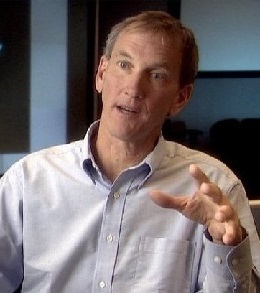
Mark Boslough, Ph.D.
WHAT: Tilting at Strawmen and Other Tricks of Climate Denial Enablers
Public perception of the climate controversy has been shaped in large part by a false narrative created by media that strive for “point/counterpoint” debates that seem “fair and balanced” to the uninformed. This framing reinforces the notion that there are actually two legitimate sides: mainstream scientists and contrarians. The most effective contrarians are not climate change deniers–they accept the fact that global warming is real and caused primarily by the burning of fossil fuels and other human influences. They understand the science but specialize in misrepresenting it and using logical fallacies and rhetorical tricks to stoke mistrust of climate scientists, thereby enabling denial and influencing climate politics. The new book “Unsettled” provides many examples of denial enablement.
WHO: Mark Boslough received his Ph.D. in Applied Physics from Caltech and was a member of the technical staff at Sandia for more than 30 years specializing in physics, geophysics, computer science, and national security applications. He now splits his time between Los Alamos National Laboratory and University of New Mexico, working on planetary defense and planetary science projects and modeling the effects of asteroid impacts and airbursts.
WHEN: 7:30pm Thursday 8 July 2021
WHERE: Online. Click HERE.
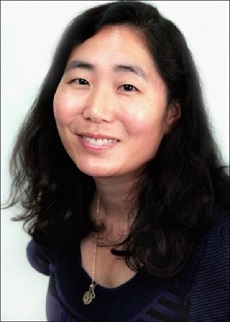
Jill Yamashita, Ph.D.
WHAT: The Truth Behind False Memories
A false memory is a memory for something that never happened to you. Memory is easily manipulated and can change without our awareness. In my talk I discuss different ways that false memories are created and how most people do not recognize the difference between an accurate and a false memory.
WHO: Jill Yamashita, Ph.D. is a Professor in the Department of Psychology and has been teaching at California State University, Monterey Bay since 2009. She earned her doctorate degree from the University of Nevada, Reno in 2003. She studies false memory, face perception and eyewitness memory.
WHEN: 7:30pm Thursday 10 June 2021
WHERE: Online. Click HERE
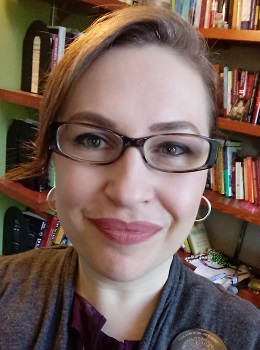
Tara C. Smith, Ph.D.
WHAT: Vaccine hesitancy in the era of COVID
The anti-vaccine movement has broadened in scope over the past year, using arguments of “medical freedom” to bring in COVID-19 deniers and anti-maskers into the fold. Concerningly, the movement has also grown more politically polarized, as those who believe COVID is a hoax and masks don’t work tend to lean right politically. With COVID-19 vaccines now becoming increasingly available, this talk will describe what has happened in the past year in anti-vaccine spaces, and what can be done to minimize hesitancy and work toward ending the pandemic.
WHO: Tara C. Smith holds a Ph.D. in microbiology from the University of Toledo and a Certificate in Agricultural Safety and Health from the University of Iowa College of Public Health. She is currently a professor in the College of Public Health at Kent State University. Previously she was the co-director of the Center for Emerging Infectious Diseases at the University of Iowa. Her research has involved studies of Ebola and emerging zoönotic diseases, of MRSA (Methicillin Resistant Staphylococcus aureus) in pigs and humans, and vaccine hesitancy She blogs on Science Blogs at Aetiology, where you can read her thoughts on these and other subjects, as well as the microbiology of zombies. Really. Check it out.
WHEN: 7:30pm Thursday 13 May 7:30pm 2021
WHERE: Online. Click HERE
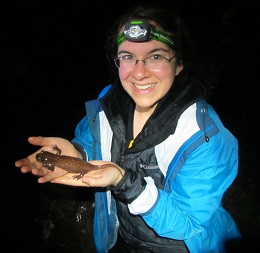
Sara ElShafie
WHAT: Why storytelling is vital to science communication
Many think that storytelling is only for fiction and frivolity. But storytelling is essential to all forms of communication. This is especially true when communicating science. Storytelling primes the brain to absorb and recall information. Without the story, the science does not stick. In this talk, I will explore the why and the how of science storytelling based on my years of experience working between academia and arts industries. The lessons learned can be useful for anyone who wants their communications to be received and considered.
WHO: Sara ElShafie is a Doctoral Candidate in the Department of Integrative Biology at the University of California, Berkeley. Her research, based at the UC Museum of Paleontology, investigates climate change impacts on animal communities over time.
She also works at the intersection of science and entertainment to make science accessible and exciting for the masses. Sara created the “Science Through Story” workshop (https://www.sara-elshafie.com/workshopsx) and consults on science storytelling projects.
WHEN: 7:30pm Thursday 8 April 2021
WHERE: Online. Click HERE
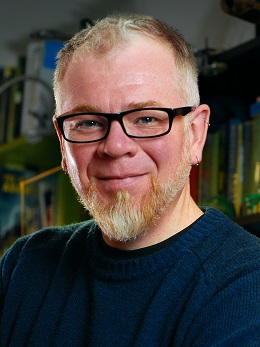
Daniel Loxton
WHAT: Haunted Humanity: The Fringe Is Not Fringe, and That’s a Big Deal
Paranormal, pseudoscientific, and fringe beliefs are chronically understudied major aspects of the human condition — and significant drivers of world events since antiquity. He explores why baseless beliefs are consistently dismissed until it is too late, and why we are so often unprepared for events we were warned about, from climate change to pandemics to the ascendancy of paranoid conspiracy theories in American politics. Paranormal and similar weird beliefs are neither a “rising tide” nor a winnable battle, but a challenging endemic reality that must be continually faced and managed. ¿What would it take to get serious about the overlooked central role that weird beliefs play in shaping society?
WHO: Daniel Loxton is a Canadian writer and illustrator who studies allegedly paranormal and other fringe claims for the nonprofit Skeptics Society. Since 2002, Daniel has been the Editor and primary creator for Junior Skeptic, the 10-page kids’ science section bound within Skeptic magazine. He is the coauthor with Donald Prothero of Abominable Science!: Origins of the Yeti, Nessie, and Other Famous Cryptids (Columbia University Press, 2013). He has also written and illustrated four books for children, including the Canadian national Lane Anderson Award-winning Evolution: How We and All Living Things Came to Be.
WHEN: 7:30PM Thursday 11 March 2021
WHERE: Online. Click HERE.
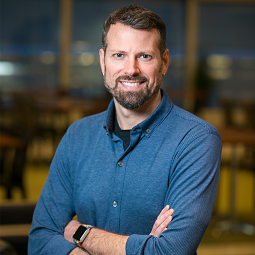
Nathan H. Lents, Ph.D.
WHAT: From Junk to Genes: The birth of new miRNA genes in the human genome.
One of the biggest surprises of the genomics era is the discovery that every family, genus, and even species, has a shocking number of unique genes that are not found in closely related species. These so-called “orphan genes” have intrigued scientists for the past two decades and their diverse origins are beginning to come to light. In this presentation, I will present evidence that at least two families of human-unique micro-RNA genes have been created through random genomic rearrangements. These micro-RNAs tweak the expression of hundreds of genes in tissues throughout the body and may have played a role in the unique evolutionary trajectory of our species.
WHO: Nathan H. Lents, Ph.D. is Professor of Biology at John Jay College of The City University of New York and the author of the popular science books Not So Different and Human Errors. He holds a Ph.D. in human physiology and completed postdoctoral training in genomics and bioinformatics at NYU Medical Center. In addition to dozens of research articles and book chapters, his writing on human evolution can be seen in the pages of Science, the Wall Street Journal, Skeptic, Skeptical Inquirer, and many others. His laboratory studies the evolution of the human genome and the genetic basis of human uniqueness. You can find his website HERE.
WHEN: 7:30PM Thursday February 11 2021
WHERE: Online. Click HERE
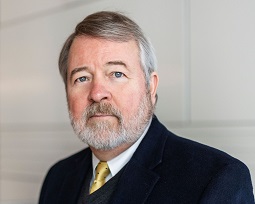
Paul Lombardo, Ph.D., J.D.
WHAT: The Continuing Relevance of America’s Eugenic Legacy
The history of eugenics is often characterized as a cautionary tale of life in the bad old days, when assumptions about genetic determinism provided a respectable veneer of “pseudoscience” that enabled barely submerged racism, xenophobia, and blatant discrimination against those with disabilities to take root in American law. Some argue that today our science is sound, our attitudes enlightened; we need not be hobbled by fear of our long expired bad eugenic habits. This talk challenges such assumptions, asserting that the same tendencies that led to a century of eugenic law and policy are still alive and continue to inform our public debate over democratic values and the proper role of science as a tool for solving social problems.
WHO: Paul A. Lombardo, Regents’ Professor and Bobby Lee Cook Professor of Law, is a lawyer/historian at the Georgia State University College of Law who is best known for his work on the legal history of the American eugenics movement. His books include: A Century of Eugenics in America: From the Indiana Experiment to the Human Genome Era (2011), Three Generations, No Imbeciles: Eugenics, the Supreme Court and Buck v. Bell (2008), and Fletcher’s Introduction to Clinical Ethics (2005).
Lombardo advised the Cold Spring Harbor (N.Y.) Laboratory panel that assembled the digital Image Archive on American Eugenics Movement and was also a contributor and consultant for the U.S. Memorial Holocaust Museum exhibit, Deadly Medicine: Creating the Master Race. From 2010-2016 he served as Senior Advisor to the President’s Commission for the Study of Bioethical Issues that reported on the US Public Health research scandal in post-WWII Guatemala.
He has been a historical consultant for several films, including Race: the Power of an Illusion Part I, The Difference Between Us (PBS, 2003), The Golden Door (Martin Scorsese/ Miramax, 2006) and Belly of the Beast (Independent Lens, 2020) He was recently featured in episodes of the NPR Hidden Brain and Radiolab podcasts as well as the PBS American Experience series: “The Eugenics Crusade.”
From 1985-1990, Lombardo practiced law in California. From 1990 until 2006, he served on the faculty of the Schools of Law and Medicine at the University of Virginia. He is an elected member of the American Law Institute and a Fellow of the American Bar Foundation.
WHEN: 6:30PM Thursday 14 January 2021
WHERE: Online. Click HERE
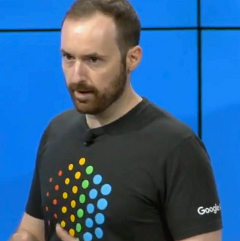
Nicholas Dufour
WHAT: Deepfakes, GANs and Visual Misinformation
The rise of Deepfakes has prompted intense coverage in the press, concern from government officials, and fear among the public. Deepfakes, along with GANs (generative adversarial networks), are a class of “generative” neural networks capable of creating highly realistic synthetic images. The widespread availability of open-source Deepfake tools means anyone with access to a computer can potentially create photorealistic fake videos and images. These fakes can, for instance, portray high-profile individuals in arbitrary–possibly compromising–situations. Because of their wide availability, relative ease of use, and harm potential, the technology has been the subject of considerable scrutiny and debate.
In this talk, we’ll discuss the current state of AI-generated imagery, including Deepfakes and GANs: how they work, their capabilities, and what the future may hold. We’ll try to separate the hype from reality, and examine the social consequences of these technologies with a special focus on the effect that the idea of Deepfakes has had on the public. We’ll consider the visual misinformation landscape more broadly, including so-called “shallowfakes” and “cheapfakes” like Photoshop. Finally, we’ll review the challenges and promise of the global research community that has emerged around detecting visual misinformation.
WHO: Nick Dufour is a Senior Software Engineer at Google Research, and a member of the team overseeing research into Deepfakes and visual misinformation. Nick joined Google in 2016 following his graduate work in Machine Learning at Stanford University.
WHEN: 7:30PM Thursday 10 December 2020
WHERE: Online. Click HERE.
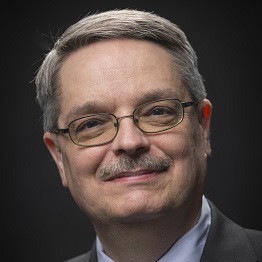
Don Lincoln, Ph.D.
WHAT: The Debate about Dark Matter: Is the Matter Settled?
The observable universe is made of stars and galaxies and gas. However, it is commonly held in the astronomy community that our universe is also made of an invisible substance called dark matter that is five times more common than ordinary matter. However, dark matter has never been observed, and the evidence for its existence is still circumstantial. In this talk, physicist Don Lincoln will give insights into the debate within the scientific community. You will learn about the historical debate, the reasons dark matter is a currently favored theory, and an appreciation for why researchers continue to look into the question.
WHO: Don Lincoln, Ph.D.
Don Lincoln is a Senior Scientist at Fermilab, America’s leading particle physics laboratory. His was a member of the teams that discovered the top quark in 1995 and the Higgs boson in 2012.
Lincoln is also an avid popularizer of science. He has written several books for the public, most recently The Large Hadron Collider. He also writes for many online venues, like CNN, Scientific American, and many others. He appears frequently on the Fermilab YouTube channel and he has made several video courses available through The Great Courses company.
He is a recipient of the 2013 Outreach Prize from the European Physical Society and the 2017 Gemant Award from the American Institute of Physics. He is a Fellow of the American Physical Society and the American Association for the Advancement of Science.
WHEN: 7:30PM Thursday 12 November 2020
WHERE: Online. Click HERE.
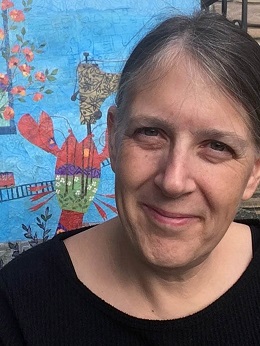
Janyce Boynton
WHAT: Facilitated Communication: Holding on to (False) Hope
Facilitated Communication (FC) is a technique used on people with severe communication difficulties as an alternative to valid Augmentative and Alternative Communication methods. Proponents claim that simply by providing emotional and physical support, people with disabilities can unlock inner language and literacy skills. However, controlled studies of the technique repeatedly show that facilitators, not people with disabilities, are authoring messages obtained via FC. Most major health and educational organizations have opposition polices for FC and strongly urge its members not to use the technique. Still, the practice persists. Former facilitator, Janyce Boynton, believes FC is not a communication technique, but a belief system within the facilitators themselves. She will discuss the various forms of FC that exist today, as well as social, emotional, and political forces that attract people to FC in the first place and make it particularly difficult to let go once the belief system takes hold.
WHO: Janyce L. Boynton, M.Ed., B.S.
Janyce is an artist, educator, and advocate for evidence-based practices in the field of communication sciences and disorders. As a speech/language clinician in the early 1990s, she became involved with facilitated communication. Her story, first as believer, then as critic, is well-documented and was featured on Frontline’s “Prisoners of Silence”. She left teaching to pursue her artwork but has continued to be active in educating people about the dangers of FC and other facilitator-influenced techniques. An overview of her experiences with FC can be found in Stuart Vyse’s “An Artist With a Science-Based Mission”, published in Skeptical Inquirer (November 2018). Her 2012 article, “Facilitated Communication: What Harm it Can Do – Confessions of a Former Facilitator”, published in the journal Evidence-Based Communication and Intervention, was the first of its kind. To date, she is one of the few facilitators world-wide to publicly acknowledge her role in producing FC messages and speak out against its use. She is currently co-hosting a series of talks with Susan Gerbic exploring the many facets of FC. (See the About Time Project link below).
Media:
Skeptical Inquirer
Taylor & Francis Online
Recorded talks:
CSICon 2019
502 Conversations
About Time Project:
FC Playlist
WHEN: 8 October 2020
WHERE: Online. Click HERE.
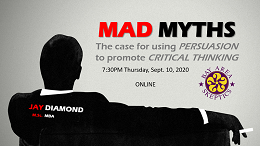
WHAT: Mad Myths: The Case for Using Persuasion to Promote Critical Thinking
Advocates of science and critical thinking often shy away from using marketing to promote their passion. This talk examines several common marketing myths that often prevent us from gaining broad adoption and suggests some well-understood techniques that science advocates and scientific skeptics can use to promote critical thinking in society.
WHO: Jay Diamond is vice chairman of Bay Area Skeptics. He holds dual masters degrees in engineering and business and has managed both startup companies and hundred-million-dollar marketing programs for Fortune 50 companies. Growing up in Canada, he performed magic, studied science, and became aware of the skeptical movement. Jay has lectured around the world on science & technology, business, and scientific skepticism.
WHEN: 10 September 2020
WHERE: Online. Click HERE
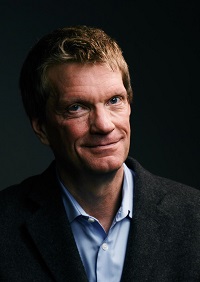
Mike Olson
WHAT: Big Data: What it is, how it’s used, where it’s headed
The world-wide explosion in data is driven by three important trends: The increasing digitization of the world, in which people and the environment have been outfitted with sensors that generate digital data; enough inexpensive storage technology to keep vast amounts of information that was previously discarded; and large-scale computing systems that can process all of it.
The advent of “big data” has driven enormous commercial and social benefits. Industries are more efficient, we produce more energy more cleanly and we diagnose and treat diseases better, all because of big data. At the same time, big data creates new and sometimes surprising problems. Our anonymity, and thus our privacy, is eroding. It is easier to target and to manipulate individuals and groups. And large amounts of data are an irresistible target for criminals and adversaries, leading to data breaches that cause real social and economic damage.
In this talk, I’ll provide some history on the advent and trends in big data. I’ll describe some of the exciting, and the troubling, examples of its transformational power. And I’ll highlight ways in which it is likely to evolve in the near future — and what we, as a society, ought to do about it.
WHO: Mike Olson
Mike Olson was a co-founder and CEO of Cloudera, the first enterprise-focused big data company, in 2008. He served in that role for five years, and became the company’s Chief Strategy Officer in 2013. He spent eleven years working closely with customers and the open source software community to deliver powerful new insights from big data, built on a new platform for large-scale data analysis. He retired in the summer of 2019. He holds Bachelor’s and Masters degrees in Computer Science from the University of California at Berkeley, and spent his career prior to Cloudera working on open source database management platforms including Postgres and Berkeley DB. He lives in Berkeley, California.
WHEN: 7:30PM Thursday 13 February 2020
WHERE: La Peña Lounge, 3105 Shattuck Avenue, Berkeley
ONLINE: Here
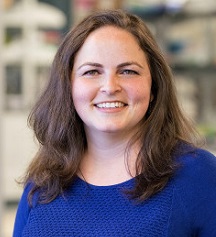
Kayla Katiraee, Ph.D.
WHAT: Are you sure that sippy-cup is safe?
Parents face overwhelming amounts of information about the safety and welfare of their children. With social media, every seemingly small decision seems impossible as the internet provides conflicting information on every topic ranging from sippy-cup safety to vaccines and medication. Most people do not assess risk correctly. They tend to overinflate small risks while ignoring large risks. But parents are particularly prone to misinformation as their risk assessment is highly skewed because the stakes seem much higher when it comes to their children. Consequently, stories and articles highlighting the dangers or risks of foods and children’s items gain a lot of traction. When these stories tap into different values or belief systems that the audience may hold, then they become part of one’s identity and worldview, and Parenting Wars are born. Throughout this presentation, Dr. Katiraee will highlight how SciMoms have tried to break through the silos in Parenting Wars. She will highlight the importance of understanding the fears that parents have, and that facts can only go so far in swaying or convincing one’s audience.
WHO: Dr. Layla Katiraee
is a product development scientist in the DNA sequencing space. She holds a Bachelors (HBSc) in Biochemistry from the University of Western Ontario, a doctoral degree (Ph.D.) in Molecular Genetics from the University of Toronto, and a certificate in Applied Bioinformatics from Penn State. Layla is also one of the directors at SciMoms, an educational non-profit dedicated to helping parents navigate through the overwhelming amounts of (mis)information and marketing claims they encounter. SciMoms strives to frame all topics through the appropriate definitions of hazard and risk, and to use nuance and relevant evidence in the topics they discuss. Established in 2017, SciMoms has written about topics as varied as gun safety, breastfeeding, trampoline safety, vaccines, and GMOs. Disclaimer: Layla’s views and opinions as expressed on SciMoms are hers alone and may not represent the views of her past or present employers.
WHEN: 7:30PM Thursday 12 December 2019
WHERE: La Peña Lounge, 3105 Shattuck Avenue, Berkeley
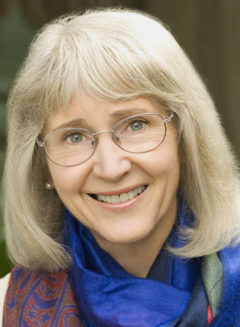
Eugenie Scott, Ph.D.
WHAT: Why do people reject good science?
How can we know the truth? Do facts matter? What distinguishes justified belief from opinion, and why do our personal biases keep us from seeing the whole picture? Join us to learn more about the anchors of scrupulous science and diligent data, how they can be exploited, and tools to find the facts for yourself.
BAS set up tables demonstrating how to think about and analyze pseudoscientific claims. In addition, there were the usual hundreds of interactive explOratorium exhibits to play with.
WHO: Eugenie Scott
WHEN: 6-10PM Thursday 7 November 2019
WHERE: explOratorium, Pier 15, San Francisco
ONLINE: Here
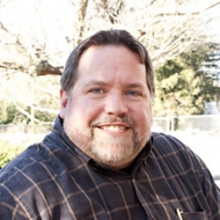
Steven Newton
WHAT: Shit Students Say: Chem trails, hollow earths, and other strange ideas about the planet
From rejection of evolution and plate tectonics to questions about chem trails and crystal energy, many introductory science students come to class with strange ideas about the earth. Can animals predict earthquakes? Is the Earth hollow? Is climate change a hoax? Spoiler alert: no. Steven Newton draws from over twenty years of undergraduate geoscience education to illustrate how mistaken views show up in geoscience classes—and what all educators can do to promote good science.
WHO: Steven Newton
After a long stint as a professional gambler, alpaca farmer, and yogi—a career which ended abruptly in what has become known in Ecuador as the ‘Night of the Supple Alpaca’– Steven Newton decided to re-invent himself as an intrepid geologist devoted to defending science education at the National Center for Science Education. Today, from his lair as the Ignatius J. Reilly Chair of Geology at College of Marin, Newton attempts to amuse confounded millennials with a combination of science memes, obscure references to events in Tudor-Stuart Britain, and pontifications about which cafes have the best coffee. Frequently voiced student concerns asking ‘Isn’t this supposed to be a geology class?’ are brushed aside with musings about the details of early Star Wars scripts.
WHEN: 7:30PM Thursday 10 October 2019
WHERE: La Peña Lounge, 3105 Shattuck Avenue, Berkeley
ONLINE: Here
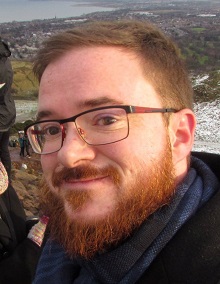
Tucker Phelps
WHAT: Successful Skepticism: Creating Lasting Community
We often look at youth as a source of hope for the future: we want them to be less prejudiced, more equitable, able to tell right from wrong and better equipped to build a better world. As Skeptics, we often tell ourselves that critical thinking and analytical reasoning are key tools for building this better future. Yet surveys show that while the newest generation of young adults supports science and scientific literacy, they are increasingly disconnected from the broader skeptical inquiry. Surveys find that US Adults 18-33 are the most likely to identify Astrology as “sort of scientific,” the most likely to fall prey to pyramid schemes and twice as likely to express skepticism in a round-earth than their older peers.
One element which may explain this trend is that social pressure to engage the world rationally is lacking. Research has shown that on its own, analytical reasoning is insufficient to prevent belief in unfounded ideas. The true test is whether or not the individual personally values critical thinking as a means of engaging with their world.
At Camp Quest, we provide children 8-17 the tools necessary to be critical thinkers and engaged members of their community. Between your traditional summer camp activities, campers are taught to engage with everyday science and given the freedom to put to practice what they learn among their peers. Campers are encouraged to ask questions and rewarded for inquiry. In this way they learn more than the bare facts of some scientific experiment, but rather how to value that process and bring it into their everyday worlds at home, school or elsewhere.
What they learn at their sleep-away summer camp they take home for the rest of the year and return again smarter and wiser. Come learn how a volunteer organization is teaching children to think critically while building a supportive community.
WHO: Tucker Phelps
For 7 years Tucker Phelps has been serving as Leadership Track Director, board member, and curriculum developer for Camp Quest West, a volunteer-run 501(c)(3) educational non-profit who envisions a world in which children grow up exploring, thinking for themselves, connecting with their communities, and acting to make the most of life for themselves and others. In his spare time, he works as an analyst in the financial sector.
WHEN: 7:30PM Thursday 12 September 2019
WHERE: La Peña Lounge, 3105 Shattuck Avenue, Berkeley
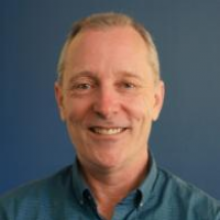
Brad Hoge, Ph.D.
WHAT: The Bitter M&Ms of Climate Change: Misconceptions and Misinformation
NCSE’s teacher ambassador program has operated under the catch phrase “turning misinformation into educational opportunities” or TMEO. But the M in TMEO can also refer to misconceptions. The program uses misconception-based pedagogy to inoculate students against the misinformation about climate change they encounter from sources such as the Heartland Institute and some fairly high-profile politicians, so either word actually works. And it’s not simply that I can’t decide which word I like best. There is a method to my madness and it has to do with the power the chimeric M provides when explaining the impact of our approach. Join me at the next Skeptics meeting and I’ll let you in on the secret.
WHO: Brad Hoge, Ph.D.
Brad Hoge has a doctorate in ecology and evolutionary biology, and has taught at the University of Houston as well as working at the Children’s Museum of Houston. He is Director of Teacher Support at the National Center for Science Education, in Oakland, CA. Dr. Hoge has taught all age groups from preschoolers to college graduate students, and he has developed and delivered professional development programs for elementary and secondary teachers. He has also worked on numerous STEM projects and programs including museum exhibits, smart games, and major public events. A published poet, he was editor of Dark Matter Literary Journal from 2013 – 2017.
WHEN: 7:30PM Thursday 9 May 2019
WHERE: La Peña Lounge, 3105 Shattuck Avenue, Berkeley
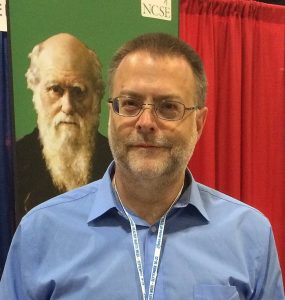
Glenn Branch
WHAT: The year in anti-science-education legislation
From the first bill to ban the teaching of evolution — introduced in Kentucky in 1921 — to the present, legislation aimed at impeding science education has been a regular feature in statehouses around the country. In 2019 alone, no fewer than eighteen such bills have been introduced to date. In his talk, Glenn Branch of the National Center for Science Education, who routinely monitors such legislation, will discuss the varieties, sources, histories, intentions, and fates of these bills — and will do his best to promote the idea that South Dakota’s “Act to protect the teaching of certain scientific information” is cursed.
WHO: Glenn Branch
Glenn Branch is Deputy Director of the National Center for Science Education. He is the co-editor, with Eugenie C. Scott, of Not in Our Classrooms: Why Intelligent Design Is Wrong for Our Schools (2006), and the author or coauthor of numerous articles on creationism, evolution education, and climate change education in such publications as Scientific American, The American Biology Teacher, and Annual Review of Genomics and Human Genetics. He is a long-time student of pseudoscience of many types.
WHEN: 7:30PM Thursday 11 April 2019
WHERE: La Peña Lounge, 3105 Shattuck Avenue, Berkeley
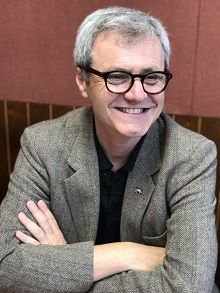
Richard Saunders
WHAT: Australia’s Psychic Detectives and Psychic “Predictions”
Just how many crimes have so-called Psychic Detectives solved in Australia? How do their claims stack up against the results? Do Police really call upon the paranormal to find missing people? Join Australian Skeptic Richard Saunders as he examines some famous crimes and the alleged supernatural connection. Also, Richard will give an overview of the world’s most comprehensive study into psychic predictions.
WHO: Richard Saunders
Richard Saunders starred as the “Skeptical Judge” on two seasons of the Australian TV show “The One: The Search for Australia’s Most Gifted Psychic”. He is also the host of the weekly podcast “The Skeptic Zone”, now in its 12th year. Richard is a frequent visitor to the Bay Area, a favorite guest at American skeptical conferences, an origami expert and children’s author, CSI Fellow and life member of Australian Skeptics.
WHEN: 7:30PM Thursday 14 March 2019
WHERE: La Peña Lounge, 3105 Shattuck Avenue, Berkeley
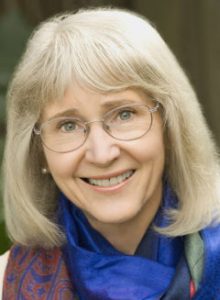
Eugenie Scott, Ph.D.
WHAT: What Would Darwin Say to Today’s Creationists ?
Many elements of the modern American creationist movement would be familiar to Darwin, especially the argument from design, which of course was very well known (and well-regarded) by educated people of his time. Young-Earth creationism, on the other hand, would be puzzling to him; Bishop Ussher’s 4004 BC age of the Earth was not considered mainstream Christian theology in the late 19th century, though certainly the view had its adherents among some clergy. Darwin might have heard of the “scriptural geologists” who promoted a young-Earth view during the 19th century, but like other scientists of his time, he would have ignored them. The current creationist strategy of disclaiming evolution as weak science would have seemed more familiar to him, given the criticisms of evolution – and personal attacks – he encountered during his own time.
WHO: Eugenie Scott, Ph.D. Founding Executive Director, National Center for Science Education, Inc.
WHEN: 7:30PM Thursday 14 February 2019
WHERE: La Peña Lounge, 3105 Shattuck Avenue, Berkeley
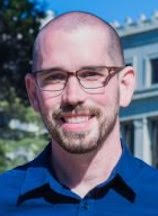
Kevin Doxzen, Ph.D.
WHAT: Common Misconceptions About CRISPR Genome Editing
Researchers have shown that an assortment of special proteins — called CRISPR — can be programmed to cut any sequence of DNA. The ability to precisely edit the genome of nearly any organism has revolutionized biology, medicine, and agriculture. From curing deadly genetic disorders to engineering drought-resistant plants, CRISPR genome editing technology will reshape modern medicine and equip us with tools to cope with a changing planet. But what about claims that human embryos have already been manipulated with this technology? What is likely and what is unlikely? And what does it mean for the future of this important technology? UC Berkeley biophysicist Kevin Doxzen will unravel this groundbreaking technology and outline pressing questions that now confront society.
WHO: Kevin Doxzen, Ph.D. Science Communications Officer, Innovative Genomics Institute, UC Berkeley
WHEN: 7:30PM Thursday 10 January 2019
WHERE: La Peña Lounge, 3105 Shattuck Avenue, Berkeley
ONLINE: Here
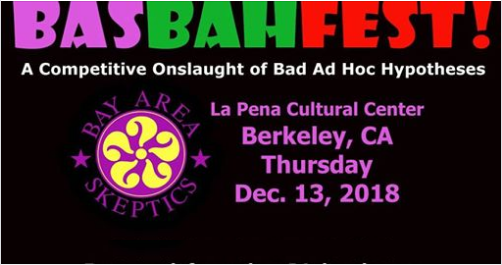
WHAT: BAH Fest: A competitive onslaught of Bad ad hoc Hypotheses.
Multiple presentations of well-argued and thoroughly researched but completely incorrect scientific theories.
- The Morphology of Steve: Eugenie C Scott, Ph.D.
- Life ain’t hard for a rock named Sue: William Patterson
- Gigantism in Space: Professor Italya Its-Soh
- A Spirited Hypothesis for Neanderthal Behavior: Kate Carter, Ph.D
Dr. Carter was won the prize of a signed book
WHO: You! Put on your warped thinking cap and help reverse the advance of science. For inspiration, check out these terrible BAHs.
WHEN: 7:30PM Thursday 13 December 2018
WHERE: La Peña Lounge, 3105 Shattuck Avenue, Berkeley
ONLINE: Morphology of Steve and A Spirited Hypothesis
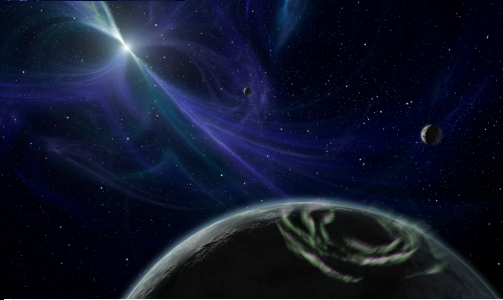
WHAT: A Skeptic’s Guide to Planet Hunting
Thousands of planets have been found circling stars other than our own in the last few decades! Come and learn about some of the underlying physics of planet hunting, as well as learn to focus your skeptical lenses to cut through to the truth for a variety of different planetary claims made from popular science articles.
WHO: Josh Lofy has a bachelor in physics and is the author of “Joshing with Physics“, a website that demystifies physics for the rest of us. He works at the ExplOratorium and is a board member of the Bay Area Skeptics.
WHEN: 7:30PM Thursday 8 November 2018
WHERE: La Peña Lounge, 3105 Shattuck Avenue, Berkeley
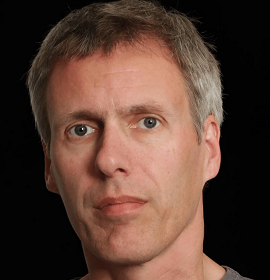
Mick West
WHAT: Beyond a Candle in the Dark – Respectfully Debunking Conspiracy Theories. How do you get through to conspiracy theorists, especially those who are close to you like friends and family? Often the first step someone takes on their journey out of the rabbit hole is the realization that they and their sources were wrong about something. To get this realization to sink in requires more than a candle illuminating their mistake, it requires a spotlight — a brightly focused blast of detailed debunking. Mick West discusses how shining a light on seemingly obscure minutia like “iron microspheres” or “ballast barrels” helps break the spell of conspiracy theory thinking.
WHO: Mick West is the author of Escaping the Rabbit Hole: How to Debunk Conspiracy Theories using Facts, Logic, and Respect. He has been debunking extraordinary claims, alternative beliefs, and conspiracy theories for over a decade on his Metabunk.org forum and draws upon this experience in his book. Before he was a debunker he was a video game programmer and thinks debunking claims has much in common with debugging code.
WHEN: 7:30PM Thursday 11 October 2018
WHERE: La Peña Lounge, 3105 Shattuck Avenue, Berkeley
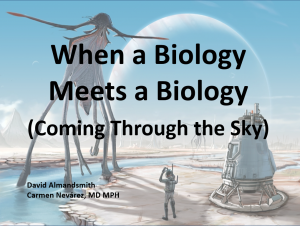
WHAT: When a Biology Meets a Biology (Coming through the Sky)
When we humans get around to colonizing a planet or moon in another star system, it will likely happen where a biology already exists, i.e. an ‘exobiology’. Protecting each of those from the other will be the challenge this SkepTalk tackles in some depth.
WHO: David Almandsmith is a board member of the Bay Area Skeptics and a long-time nerd. He graduated in biology from U.C. Berkeley and studied physiology at Cal State Eastbay. A version of this talk was presented at the 100 Year Starship Symposium in Houston.
WHEN: 7:30PM Thursday 13 September 2018
WHERE: La Peña Lounge, 3105 Shattuck Avenue, Berkeley
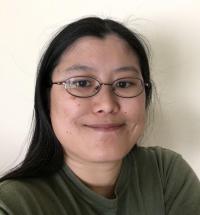 Julie Hui
Julie Hui
WHAT: Common Misconceptions in Anthropology
Anthropology, the study of human societies and cultures, is fertile ground for controversies and popular misconceptions. If you are curious about why an anthropologist might cringe when thinking of children playing on monkey bars, and why anthropologists care about hamster cannibalism, then this is the talk for you.
WHO: Julie Hui is a PhD Candidate in (Biological) Anthropology at UC Berkeley. She loves to talk about all aspects of science and nature, but cooperation and brain evolution are near and dear to her heart. Soon-to-be Dr. Hui spends most of her time teaching Introductory Anthropology courses at Bay Area Community Colleges and is currently a Wonderfest Science Envoy.
WHEN: 7:30PM Thursday 10 May 2018
WHERE: La Peña Lounge, 3105 Shattuck Avenue, Berkeley

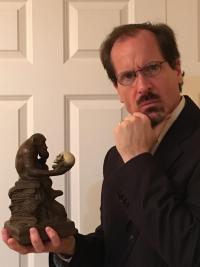 Bill Patterson
Bill Patterson
WHAT: SKEPARDY!
All Bay Area Skeptics love Jeopardy! C’mon, yes you do! This admitted, you’ll really love “Skepardy!” Come one, come all to the next SkepTalk and test your skeptical mettle as Alex Skeptek, aka Bill Patterson, channels (yes, literally) the real Jeopardy! interlocutor for some fast-paced fun. Bill has been quizzing clever people for years, and loves to challenge new blood. Sorry, no prize money will be awarded. The goal is simply good, informative fun.
WHO: Bill Patterson was a high school physics teacher for ten years, a Peace Corps volunteer, and youth agency executive. He currently is a radiation therapist living in Sonoma County. He loves all things rational, and is a regular attendee at SkeptiCal.
WHEN: 7:30PM Thursday 12 April 2018
WHERE: La Peña Lounge, 3105 Shattuck Avenue, Berkeley
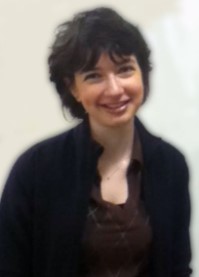 Miriam Diamond, PhD
Miriam Diamond, PhD
What: A Quirky Colloquium Quashing Quantum Quackery
It’s fashionable for the names of products and services to include the word “quantum”, but does that have any validity in the realm of quantum physics? Is it just a nonsense buzzword? From “quantum computing” to “quantum biology” to “quantum jumping”, this colloquium will put you in a super-position to tell the difference.
WHO: Dr. Miriam Diamond is a high-energy particle physicist, currently employed as an Experimental Research Associate at the SLAC National Accelerator Laboratory. Born in Canada, she earned her PhD from the University of Toronto. She worked at the Sudbury Neutrino Observatory, the Institute for Quantum Computing, and the Perimeter Institute for Theoretical Physics. She was also a member of the ATLAS Collaboration at the CERN Large Hadron Collider in Geneva. Assisted by her guinea pig Quark, she enjoys participating in science outreach to students and the general public.
WHEN: 7PM Thursday 8 March 2018
WHERE: Kells Irish Pub, Jackson Street, San Francisco
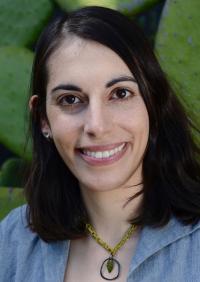 Tania Lombrozo, PhD
Tania Lombrozo, PhD
What: The Human Drive to Explain
Stephen J. Gould described humans as “the primates who tell stories.” Psychologist Robyn Dawes took it one step further, arguing that we’re “the primates whose cognitive capacity shuts down in the absence of a story.” Why are we so motivated to find a good story or explanation? Is this tendency beneficial? Cognitive psychologist Tania Lombrozo will suggest that our “drive to explain” itself explains some of the most remarkable human achievements, but also some of our failings.
WHO: Dr. Tania Lombrozo is Associate Professor of Psychology at UC Berkeley, where she directs the Concepts and Cognition Lab. She is also an affiliate of the Department of Philosophy and a member of the Institute for Cognitive and Brain Sciences.
WHEN: 6PM Thursday 8 February 2018
WHERE: Aduro Biotech, 740 Heinz Avenue, Berkeley [Map]
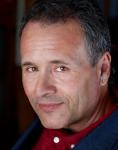
Ransom Stephens, Ph.D.
What: Neuroscience and the Great Questions
This SkepTalk combined science, mirth, and intellectual acumen; a genuine treat. Dr. Stephens brought the audience up to date with fruits of neuroscience research and melded them with an evolutionary perspective.
Dr. Stephens began by pointing out that neuroscience in some sense is self-referential – a case of the brain trying to understand itself.
He then warned against over-simplified ideas such as strict roles for the left brain versus roles for the right brain. There are indeed some differences in roles but…
there is some overlap in duties, especially since the brain evinces considerable plasticity. In the most general case, when you walk into a bar (!) the right brain checks for the unexpected – an acquaintance, a hungry leopard, etc. – without ‘you’ necessarily aware of the search. Any significant results of the search are passed off to the left brain and into your consciousness. Sort of. Neuroscience is still in its infancy.
And how does something bubble up into your consciousness? Dr. Stephens likes the metaphor of the coffee percolator: activity heats up down in our unconscious until a ‘boiling point’ when activity percolates up into our conscious. Not a perfect metaphor but somewhat useful at this date.
The normal functioning of the human brain leads to “idea prejudice.” Here is how that works:
-
- our brain obsessively searches for patterns it might recognize; faces, predators, events
- we frequently perceive patterns when the perception is incorrect; i.e. pareidolia or the misinterpretation of random sequences (person appears in your dream and they have a car accident the next day); we categorize fast and think/analyse slowly
- our brain suppresses things it fails to categorize whether philosophical, cultural, or even visual (I showed a picture of a blimp to a co-worker and she said she had never seen one. I explained
what blimps were and a month later she ‘saw’ one in the sky for the first time.)
- when the brain encounters previously ‘accepted’ patterns, those patterns are reinforced; this phenomenon, called confirmation bias, applies to visual patterns (face on the moon) as well as to other patterns such cause and effect (my cold went away after drinking rosehip tea) accepted modes of behavior, and value judgments (the mayor is a crook); information suggesting the mayor is decent is suppressed while criticisms of the mayor reinforces the bias
Dr. Stephens shared the discovery that infants have two or three times as many neuronal connections as older children. It may be that infants experience mental chaos and synesthesia that lessens as ‘inappropriate’ connections are pruned away leaving functionally ‘valuable’ neural systems.
The question as to which is more important, Nature or Nurture, is so simplistic as to be wrong. Both collaborate to shape the brain. Everything the brain processes originated from the senses.
All ‘normal’ human brains allow the person to develop exceptional talent. A person who devotes intense practice for two hours a day to some complex skill will, in time, be viewed as exceptionally talented, be it in music, mathematics, juggling, video games, etc.
Dr. Stephens offered theories of “consciousness” and “sentience.” He proffered a system where there are levels of sentience. Most of the history of live on our planet consisted of single-celled organisms which amazingly appear to have situational awareness and the ability to respond appropriately to changes around them. Multicellular creatures such as nematodes, anemones, snails, and even plants have somewhat more ability to respond appropriately. Animals with larger brains such as some non-human mammals and dinosaurs (birds) show the additional abilities of abstraction and strategizing. These abilities are rather modest compared to the levels capable of the human brain. It may be that a brain with a hundred billion neurons each with ten thousand axonal connections to other neurons reaches a level where a threshhold effect reaches a critical level that confers a higher level of self-awareness. ¿Or is it still a continuum? The jury is out.
He left us with homework: he suggested we Google Christof Koch. I did that and learned that he is “an American neuroscientist best known for his work on the neural bases of consciousness.” Furthermore he “introduced the concept that consciousness is a fundamental property of networked entities.” Cool.
Books by Dr. Ransom Stephens:
* The God Patent, 2009, a novel
* Your Pursuit of Greatness, 2011
* The Sensory Deception, 2013, a novel
* The Left Brain Speaks, the Right Brain Laughs, 2016
(David Almandsmith)
WHO: Dr. Ransom Stephens. As a particle physicist, he worked on experiments at SLAC, Fermilab, CERN, and Cornell, discovered a new type of matter, and worked on the team that discovered the Top quark. During the tech boom that ended in 2001, he directed patent development for a wireless web startup, and later became an expert on timing noise. His specialty at this time was the analysis of electrodynamics in high-rate digital systems. [Wikipedia]
WHEN: 6PM Thursday 14 January 2018
WHERE: La Peña Lounge, 3105 Shattuck Avenue, Berkeley, CA
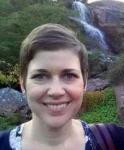
Carrie Ellen Sager, J.D.
WHAT: Top Ten Myths of Homelessness
The problem of homelessness in the Bay Area may border on intractability and underscores the failures of United States’ political economics. The top ten myths of homelessness are:
1. Most of these people aren’t from here, they just come for the services (and the weather).
2. Some people just want to be (carefree and) homeless.
3. People are really happy once they get housed.
4. If we start housing the homeless, more will come here.
5. You can’t just put a junkie in a house.
6. We can’t solve homelessness because there’s not enough housing.
7. Let’s do what they do in Utah, I heard that’s really good.
8. With ‘Housing First’, people will get sober, get a job, and go on to live independently.
9. Tiny homes sound like a great way to house people.
10. (Expect the unexpected during the SkepTalk)
WHO: Carrie Sager is the Executive Coördinator of the Homelessness Program of the County of Marin.
WHEN: 7:30pm, Thursday December 14 2017
WHERE: La Peña Lounge, 3105 Shattuck Avenue, Berkeley, CA
ONLINE: Here
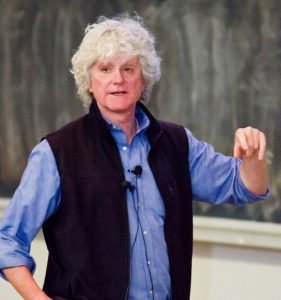
Kevin Padian, Ph.D.
WHAT: Myths of Mass Extinctions
Everyone talks about mass extinctions. But what are they, really? Can anyone even define them? Let’s see.
WHO: Kevin Padian, Ph.D. is a professor of Integrative Biology at UC Berkeley and a curator in the Museum of Paleontology. An expert on dinosaurs and the origin of flight, he has authored or edited several books on the evolution of dinosaurs. He is a former president of the board of directors of the National Center for Science Education.
WHEN: 7:30pm, Thursday November 9 2017
WHERE: La Peña Lounge, 3105 Shattuck Avenue, Berkeley, CA

Brad Hoge, Ph.D.
WHAT: Hurricanes and Heat Waves: Is This Climate Change?
This talk will focus on two questions. 1) Are Hurricanes Harvey and Irma, and the recent heat waves and extreme weather events in California the product of climate change? 2) If they are, how should they influence public discussions and teaching of climate change? To answer the first question, we must know what the predictions of extreme weather events from climate models are, and how these predictions are generated. Is there a consensus among climate scientists that extreme events are more likely? How much more likely are they? And how extreme are Harvey, Irma, and the California heat wave? Ultimately, how do we connect the dots? If a connection is made, how useful is this information for public discussion? Will the conclusions of climate scientists be more convincing due to the dramatic impacts of these events on people’s lives, or are we being “insensitive”? Is it a good idea to use these events as examples of the impact of climate change in classrooms, or is it misleading and inappropriate pedagogically? This talk will answer these questions, and will present some perspectives from teachers in Houston and Florida who are on the front lines.
WHO: Brad Hoge, Ph.D. is Director of Teacher Support at the National Center for Science Education.
WHEN: 7:30pm, Thursday 12 October 2017
WHERE: La Peña Lounge, 3105 Shattuck Avenue, Berkeley, CA
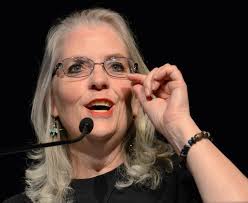
WHAT: Beyond the Choir – Guerrilla Skepticism on Wikipedia
As the largest and most popular reference work on the Internet, Wikipedia MIGHT be the source of much pseudoscientific misinformation. It isn’t, however, due in large part to the Guerrilla Skepticism on Wikipedia (GSoW) project. Since 2010, GSoW has reviewed and corrected — or wholly created — Wikipedia pages concerning scientific skepticism. Come learn how the wired world’s source of information (40 million articles in more than 250 languages) remains largely free of pseudoscience.
WHO: Susan Gerbic
Affectionately called the Wikipediatrician, Susan Gerbic is the founder of GSoW. She is a frequent contributor to Skeptical Inquirer (CSICOP) and Skepticality Podcast. She is the winner of the CSI In the Trenches Award from 2012, James Randi Award for Skepticism in the Public Interest 2013, and a Scientific and Technical Consultant for CSI.
WHEN: 7:30PM Thursday May 11 2017
WHERE: La Peña, 3105 Shattuck Avenue, Berkeley
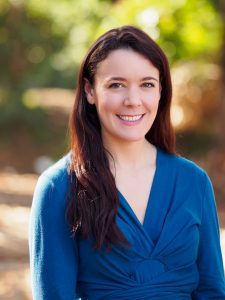
Lauren Popov, Ph.D.
WHAT: An Invisible Plague: the Growing Threat of Tuberculosis
You might think of tuberculosis as an antiquated disease: an infection largely conquered, and isolated to the most impoverished nations; and you would be dead wrong. In this talk, we will explore the history and science of Tuberculosis to understand why this ancient bacterial foe is arguably today’s greatest infectious threat to global public health.
WHO: Lauren Popov, Ph.D., Postdoctoral Scholar, Molecular & Cell Biology, UC Berkeley
WHEN: 7:30pm, Thursday 13 April 2017
WHERE: La Peña Lounge, 3105 Shattuck Avenue, Berkeley, CA
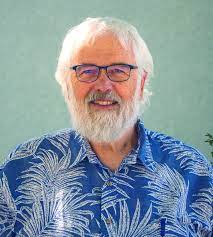
Kent McDonald, Ph.D.
WHAT: Are Saturated Fats Bad for You? Separating Fat from Fiction
In the fall of 2014 Kent McDonald became interested in the science behind federal nutritional guidelines and has since learned that there isn’t much that can be trusted. His presentation will look at why this is so and consider some healthier nutritional strategies based on more reliable information.
WHO: Kent McDonald received his Ph.D. in Botany from the University of California, Berkeley in 1972. He is currently at UCB as the Director of the Electron Microscope Laboratory.
WHEN: 7:30pm, Thursday 9 February 2017
WHERE: La Peña Lounge, 3105 Shattuck Avenue, Berkeley, CA
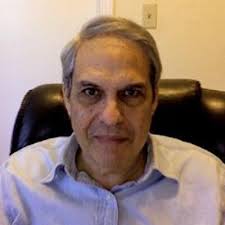
Mark Tarses
WHAT: Harry Houdini vs. Psychics & Mediums
After World War I, as grieving widows and mothers wanted to contact their dead husbands and sons, the number of professional psychics and occult mediums exploded. Harry Houdini traveled across American exposing these people as the frauds they were. Being the world’s most famous magician, he knew all their tricks.
WHO: Mark Tarses, President of Oakland Magic Circle.
WHEN: 7:30pm, Thursday 12 January 2017
WHERE: La Peña Lounge, 3105 Shattuck Avenue, Berkeley, CA

Richard Saunders
WHAT: Too Good to be True?
From rubber wrist bands said to improve your balance, plastic cards that claim to improve the taste of wine, devices with no moving parts and needing no power input to rid your house of rising damp, to computers that claim to scan your body just like on Star Trek, to you name it! In many years of investigations Richard Saunders has seen his fair share of strange devices. Find out the story behind some of the machines that are ‘Too Good to be True.’
WHO: Richard Saunders is an Australian skeptic and podcaster. He is a life member of Australian Skeptics, CSI Fellow, founded Sydney Skeptics in the Pub, has represented the Australian Skeptics on television and radio shows, and is the co-host of the Skeptic Zone podcast.
WHEN: 7:30PM Thursday December 29 2016 (Special Occasion; not the usual 2nd Thursday!)
WHERE: La Peña, 3105 Shattuck Avenue, Berkeley
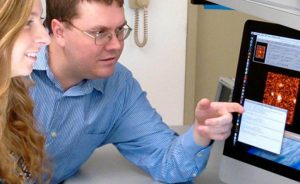
Thomas Targett, Ph.D.
WHAT: Myths of Astronomy
Much of what we think we know about space comes from film and television. However, Hollywood’s job is more often to entertain than to educate. In this presentation, Prof. Targett will sort fact from fiction, taking a tour through the worlds of Star Trek, Star Wars, and much more.
WHO: Thomas Targett, Ph.D., Associate Professor of Astronomy & Physics, Sonoma State University. Thomas Targett obtained his undergraduate and masters degrees from Cardiff University, in Wales U.K., with a research focus on 21-cm emission from neutral hydrogen. He obtained his PhD from the University of Edinburgh, Scotland, in the fields of sub-millimeter galaxy evolution and the coupled growth of galaxies and black holes. In 2007, Dr. Targett began a research postdoc at Caltech, followed by similar appointments at the University of Birmingham (UK), the University of British Colombia, and the University of Edinburgh.
WHEN: 7:30pm, Thursday 10 November 2016
WHERE: La Peña Lounge, 3105 Shattuck Avenue, Berkeley, CA
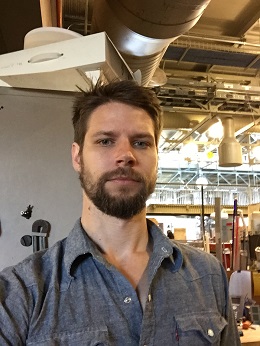
Paul Stepahin
WHAT: Angle Trisection: A problem many tried to solve
Throughout history many people have tried to find some seemingly simple solutions to problems that were not understood because of the limits of knowledge about how things really work. Alchemy, tried to do more than just make gold, and perpetual motion tried to overcome the laws of thermodynamics. Science and Reason have not always been applied as they are now! Not so well known but equally fascinating is the history of angle trisection. Dividing an angle into three equal parts is not as easy as it seems it should be. We’ll review thousands of years of attempted trisection and the rich mathematics unearthed by this deceptively simple geometry problem.
WHO: Paul Stepahin grew up in San Diego but has never been on a surfboard. He studied physics in college but is still baffled by things like zippers. He’s been at the Exploratorium for the last decade, building boxes, changing lightbulbs and occasionally speaking to the public. He first gave this talk about angle trisection at a wake for dead science ideas.
WHEN: 7:30PM Thursday 10 September 2015
WHERE: La Peña Lounge, 3105 Shattuck Avenue, Berkeley
ONLINE: Here
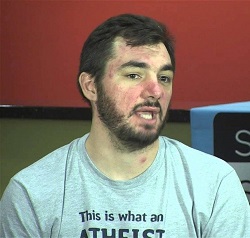
Dan Pemberton, Secular Students Alliance
WHAT: Herding Cats and Teaching Science: What I Learned About the Reluctance to Embrace Life, the Universe, and Everything
When Secular Students Alliance regional organizer Dan Pemberton began his work with secular student groups, he expected to see a battle for science literacy with clean lines of science advocates vs. religious fundamentalists. He quickly learned that in almost every secular campus community exists a recognizable population of students who reject science and the scientific community but espouse other secular values. What’s more, he learned that the reasons for this rejection of science are largely ignored by advocates of scientific literacy.
WHO: Dan Pemberton is the Secular Students Alliance Regional Campus Organizer for the Southwest region. He was President of the Secular Student Alliance at Sacramento State University. In his spare time, Dan enjoys all things tech, LEGOS, and Doctor Who. Dan’s passion is for everyone to become a better critical thinker, no matter their religion.
WHEN: 7:30PM Thursday 9 April 2015
WHERE: La Peña Lounge, 3105 Shattuck Avenue, Berkeley
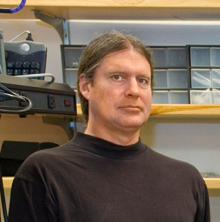
Russel Wilcox
WHAT: Quantum Pseudoscience and the Nature of Mind
Popular misconceptions about the significance of quantum physics are often used to sell questionable products. Key among these misconceptions is the claim that matter is mind-dependent. Rather than simply debunk this and similar claims, Russell Wilcox will explore the serious philosophical basis for an interpretation of quantum physics that addresses them. This will lead to other questions, including “what is the mind and where is it located?”
WHO: Russell Wilcox is a laser engineer at the Lawrence Berkeley National Laboratory. He holds ten optics-related patents, including one for an optics education device. He has developed educational displays and teaching materials at Lawrence Livermore Laboratory and at Burning Man, where he has lectured for several years on philosophy and quantum physics.
WHEN: 7:30pm, Thursday, February 12, 2015
WHERE: La Peña Lounge, 3105 Shattuck Avenue, Berkeley, CA
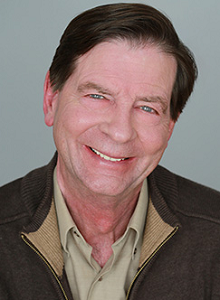
Dr. Patrick O’Reilly
WHAT: The Manson Family, Cults, and the Psychology of Commitment
The history and creation of the Manson Family, the family’s crimes, and the psychological commitment mechanisms that cause people to join (and stay in) cults.
WHO: Dr. Patrick O’Reilly, Asst. Clinical Professor of Psychiatry, UCSF
Dr. Patrick O’Reilly is a clinical psychologist at Napa State Hospital and an Assistant Clinical Professor of Psychiatry at the University of California, San Francisco. He is co-author of the book Undue Influence: Cons, Scams, and Mind Control, and is particularly well versed in the inner workings of cults, having joined one to study it for his doctoral dissertation. Dr. O’Reilly is former Chair of Bay Area Skeptics and Past President of the San Francisco Psychological Association.
WHEN: 7:30PM Thursday 8 January 2015
WHERE: La Peña Lounge, 3105 Shattuck Avenue, Berkeley
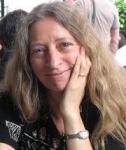
Liza Gross
WHAT: Writing About Vaccines When Evidence Doesn’t Matter
On Wednesday, October 10th, the Bay Area Skeptics hosted an entertaining and informative one-hour talk by Liza Gross.
Her talk, entitled “Writing about Vaccines When Evidence Doesn’t Matter,” examined not only the claims made by people who speak out against the use of vaccines, but also the media’s role in providing them a platform for their sometimes dangerous fringe views.
Ms. Gross’ talk began with a somewhat humorous clip from “When Worlds Collide,” a 1951 science fiction film in which a planet and a star are discovered to be hurtling through space, on a collision path toward Earth. In the clip, numerous characters argue about what to do, and whether the threat is even real. Denialism abounds, leading one frustrated man to exclaim, “I think all you scientists are crackpots! Nothing is going to happen,” just as the room in which he is seated begins to shake violently, causing tables to overturn, glass to shatter, etc. The analogy was quite apt. In a very real sense, each of the components in the clip (a worldwide threat, scientists working hard to save lives, and an emotional debate about whether the threat is real) is alive today in the anti-vaccine debate. Rather than a gigantic, intergalactic menace, however, the threat created by the anti-vaccine movement is microscopic and homegrown: viruses.
Viral infections are among the largest threats to humanity, and have wrought havoc upon entire populations throughout human history. The smallpox virus alone was responsible for up to 20% of the deaths each year in Europe up to, and including, the 18th century. The advent of vaccination changed this completely. Although immunization of various kinds has been recorded as early as 1000 BCE, the modern practice of vaccination is largely a product of breakthroughs in the 19th and early 20th centuries. In that time, medical research produced vaccines for diphtheria, measles, mumps, rubella (a.k.a, German measles), smallpox, and perhaps most famously, polio. Given the seemingly miraculous improvements in life expectancy and quality of life brought by these scientific breakthroughs, one might expect nearly one-hundred percent support for their use. That assumption would be wrong.
Gone are the days when people like Jonas Salk, developer of the first polio vaccine, were universally hailed as heroes. Thanks to a few misguided celebrities, a handful of highly publicized but poorly designed studies, and an increasingly credulous public (most of whom have never experienced a world devastated by viral infection), vaccination rates are plummeting, putting millions at risk, particularly children. As David Ropeik reported in Contemporary Pediatrics in August of 2011, rates of immunization are declining rapidly across the country and around the world, causing not only increases in disease outbreaks (156 cases of measles in the first half of 2011, for instance, versus just 56 cases over the seven-year period between 2001 and 2008), but also a decrease in the effectiveness of current vaccines, partly due to the rise in disease incidence.
Ms. Gross spoke at length about periods in the history of vaccination resistance. Although various groups have expressed opposition to vaccination on religious grounds, xenophobia, or claims of the ineffectiveness of vaccines, today’s anti-vaccine fears, Ms. Gross said, are largely fueled by a 1998 paper by former surgeon and medical researcher Andrew Wakefield. In the paper, published in the British medical journal The Lancet, Wakefield and his associates claimed to have identified a new syndrome, autistic enterocolitis, claiming a link between autism and the MMR (measles, mumps, rubella) vaccine. As the scientific community rallied to question the claim, the 12 co-authors of the article quickly began jumping ship, distancing themselves from both Wakefield and the study. In the end, The Lancet reluctantly published a retraction, but the damage was already done. Wakefield’s subsequent troubles with the General Medical Council, who found him guilty of “dishonesty and irresponsibility,” only endeared him more to the anti-vaccine proponents as a victim of a callous and cruel medical system that refused to listen to his conclusions because they stood to lose money if vaccinations became less common.
After years of reading and writing about the anti-vaccination crowd, Ms. Gross has summarized their mis-education movement into a list of six basic tactics:
1. Conspiracy (e.g., “The government and/or scientists are working against the public interest, and engage in activities that harm us for their own financial or political gain.”)
2. Fake experts (e.g., disgraced scientist Andrew Wakefield, Generation Rescue founder J. B. Handley, former model Jenny McCarthy, actor Rob Schneider, etc.)
3. Cherry picking (i.e., choosing outdated or discredited publications as “proof” that vaccines are harmful)
4. Impossible expectations (e.g., challenging researchers to carry out a study in which vaccinated children are compared to unvaccinated children, allowing the latter to be put at risk of deadly diseases.)
5. Misrepresentation (distortions, half-truths, and lies about scientists’ positions on vaccine effectiveness and safety)
6. Seeding doubt (e.g., “I’m not saying to stop vaccinating. I’m simply raising questions, and the scientists seem to be hiding the answers.”)
To aid them in their campaign, as Ms. Gross pointed out, anti-vaccine proponents have some powerful allies. Jenny McCarty, for instance, has been an almost constant presence on shows such as Oprah, Larry King Live, and will soon have her own talk show on the Oprah Winfrey Network (OWN) which will give her daily access to millions of viewers.
The sad truth is that anti-vax tactics have already been extremely successful in convincing people to stop vaccinating their children. If parents in the state of California are any indication, the U.S. has a long, painful road ahead of it. Parents are choosing not to vaccinate their children in record numbers. This, despite last year’s record-setting whooping cough outbreak. According to a recent article by Jocelyn Wiener, of the CHCF Center for Health Reporting, pediatricians and state health officials are sounding the alarm over the tripling in “personal belief exemptions” (PBE) which allow unvaccinated children to enter public school. In some parts of Santa Cruz County in California, PBE rates have risen to 17 percent or more, among the highest in the nation. This not only puts these children at risk, but also risks the health and well-being of the children with whom they come into contact.
The bright spot is that there are things we skeptics can do to help. When you see an online article with incorrect information, take the time to write a comment expressing your views and guiding people toward scientific information. Write letters to the editor of your local newspaper warning people about the dangers of not vaccinating their children. Join skeptical organizations like the Hug Me I’m Vaccinated campaign, and consider making a donation to the cause if you can. And perhaps most importantly, get yourselves and your children vaccinated, and talk about it with your friends. If you are a scientist or someone involved with communicating scientific ideas to the media, you might also consider checking out Compass, an organization that supports scientists in developing the communication skills needed to engage journalists, policymakers and other non-scientist audiences.
WHO: Liza Gross is a freelance writer based in the San Francisco Bay Area. She writes for numerous organizations, including the open-access biomedical journal PLoS Biology where she is a senior editor, KQED’s QUEST (for which she recently interviewed our own Eugenie Scott), and several other publications. She writes about wildlife, ecology and evolution, conservation, environmental health, science policy, and many other topics.
WHEN: 7:30PM Wednesday 10 October 2012
WHERE: La Peña Lounge, 3105 Shattuck Avenue, Berkeley
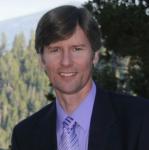
Prof. Sheldon Helms
WHAT: Gay Conversion Therapy: You Make Me Sick
Sheldon’s presentation was particularly timely because on September 29th, Governor Jerry Brown signed into law Senate Bill 1172, which protects lesbian, gay, bisexual and transgender (LGBT) minors from “reparative” therapies administered by mental health professionals aimed at altering sexual orientation or gender identities and expressions.
Governor Brown was quoted as stating that such misguided an unscientific psychotherapy “will now be relegated to the dustbin of quackery…This bill bans non-scientific ‘therapies’ that have driven young people to depression and suicide.” As overdue as this new law was, it will sadly and tragically not prevent amateur therapists with a religiously rigid orientation on what constitutes “acceptable” sexual expression and sexual identity from inflicting their views on young people who are confused, guilty and frightened by being told that their self- identities are sinful.
In his presentation Sheldon clearly, and in a remarkably entertaining manner, demonstrated just how persistently a bad idea can flourish, particularly when it is solely faith-based and devoid of even a modicum of empirical evidence. In presenting a history of this topic, he pointed out that it was not until 1973 that the American Psychiatric Association, arbiters of The Diagnostic and Statistical Manual of Mental Disorders (DSM), removed homosexuality from its list of mental disorders. Even this action was met with protest and a petition was immediately circulated among psychiatrists protesting its removal. A compromise of sorts was reached when a new diagnosis, ego-dystonic homosexuality, was included in the DSM’s third edition in 1980. Ego-dystonic homosexuality was defined as “(1) a persistent lack of heterosexual arousal, which the patient experienced as interfering with initiation or maintenance of wanted heterosexual relationships, and (2) persistent distress from a sustained pattern of unwanted homosexual arousal.” This diagnosis, however, was also removed completely from the DSM in 1986 because a consensus of psychiatrists concluded that the emotional difficulties related to ego-dystonic homosexuality could be better understood and treated by diagnoses already in the DSM and it because inclusion of this diagnosis in the manual reinforced antigay bias.
Sheldon pointed out that the origins of the idea that homosexuality is a mental illness can be found in the work of psychiatrist von Krafft-Ebing, who, in his book Psychophathia Sexualis, maintained that the purpose of the sexual act is procreation and in which he condemned homosexuality, comparing it to pedophilia. Freud, a protégé of sorts of Krafft-Ebing, was less strident. Freud did not consider homosexuality harmful. Although in certain circumstances he incorrectly believed it could be pathological, he saw no value in psychoanalyzing someone as a means of “curing” homosexuality.
The breakthrough on “de-pathologizing” homosexuality really occurred due to the research of Dr. Evelyn Hooker, author of the 1957 research paper “The Adjustment of the Male Overt Homosexual”. This research paper conclusively demonstrated that there is no difference in the levels of neurosis between heterosexuals and homosexuals. When her research was subjected to double blind testing, her peers could also detect no difference. To quote Sheldon, “In terms of psychological adjustment, there were no differences between the members of each group.” Although one might assume, based on the changing attitudes of the American Psychiatric Association and the overwhelmingly conclusiveness of Dr. Hooker’s research, that the mental health profession would have recognized that sexual orientation is not a matter of choice and in itself not emotionally harmful. One might think that but one would be wrong; bad ideas die a slow death.
Dr. Robert Spitzer, professor of psychiatry at Columbia University, was Chair of the DSM task force in 1973 and was instrumental in removing homosexuality from the manual’s list of mental illnesses. It’s unfortunate that Dr. Spitzer did not stop there. He had withstood the criticism of a sizeable number of his peers and had done a brave and scientifically credible act. Unfortunately, a later study published by Dr. Spitzer did lasting harm. In 2003 a research article he wrote, published in the journal Archives of Sexual Behavior, maintained that homosexuals can change their sexual orientation. In other words, sexual orientation was a matter of choice. To quote from Dr. Spitzer’s journal article’s abstract:
The participants were 200 self-selected individuals (143 males, 57 females) who reported at least some minimal change from homosexual to heterosexual orientation that lasted at least 5 years. They were interviewed by telephone, using a structured interview that assessed same sex attraction, fantasy, yearning, and overt homosexual behavior. On all measures, the year prior to the therapy was compared to the year before the interview. The majority of participants gave reports of change from a predominantly or exclusively homosexual orientation before therapy to a predominantly or exclusively heterosexual orientation in the past year. Reports of complete change were uncommon. Female participants reported significantly more change than did male participants.
It was a terribly flawed study and even Dr. Spitzer acknowledged its weaknesses in the paper’s abstract. Why he went and ahead and published it anyway is a mystery to me and why the journal accepted it for publication is an even greater mystery. Succinctly: Dr. Spitzer relied only on self-reports. The difficulty with self-reports is that there is no way to determine if the person is lying – and clearly an awful lot of Dr. Spitzer’s subjects lied to him. Dr. Spitzer later publicly acknowledged the study’s serious flaws, although he did not recant its conclusions. But the acknowledgement was much too little and far too late; the damage had been done. Dr. Spitzer’s high status (psychiatrist, Columbia University professor) gave credence to an outlandish and scientifically unsupported belief system that opened the flood gates to a wide assortment of strange and religiously zealous characters, many of whom had little or no mental health training, but all of whom fervently believe that homosexuality is an abomination that can be “cured” by their assortment of odd and untested therapies, and of course by prayer. In his talk, Sheldon clearly described the behaviors of these fine and upright citizens who “love the sinner but not the sin.”
Sheldon then introduced his audience to the main players in the gay conversion movement. One of these is the National Association for Research and Therapy of Homosexuality (NARTH), an organization that purports to be scientifically based, and which states on its web site, “We are focused on the right of persons to deal with unwanted sexual attractions as well as the right of therapists to offer psychological care to those who wish to deal with these attractions by diminishing or eliminating them rather than just identifying with and acting upon them. We acknowledge and respect the right of individuals to claim a gay identity.” One of its founders, Joseph Nicolosi, Ph.D., claims on his personal website that “You Don’t Have to Be Gay: Diminish your unwanted homosexuality, Develop Your Heterosexual Potential.”
Although NARTH denies all religious affiliation, one of NARTH’s past presidents, Judith Hamilton, Ph.D., states on her web site that she “…conducts seminars for pastors and Christian leaders on the origins of homosexuality and how to minister to homosexuals. She has produced a video entitled ‘Homosexuality 101: Where Does it Come From, Is Change Possible, and How Should Christians Respond?’ ” The current president of NARTH, Christopher Rosik, Ph.D., published an article entitled “Change in Homoerotic Behavior and Feelings is Possible: Genetics Play Only a Weak and Indirect Role,” which is listed in Resources for Pastoral Ministry Concerning Sexuality in the Presbyterian Coalition. A former NARTH President, Jerry Harris, Ed.D. states on his web page that he “was a manager for LDS Family Services for many years.” Incidentally, the name of NARTH founder Dr. Nicolosi’s therapy clinic is Thomas Aquinas Therapy Clinic.
The efforts of Exodus International were also covered by Sheldon. Exodus was found in 1976 and is a “non-profit, interdenominational ex-gay Christian organization that seeks to limit homosexual desires.” The former Chairman of the Board of Directors of Exodus International, John Paulk, along with his wife, toured the United States, speaking at conferences and to the media about his successful heterosexual and religious conversions. The Paulks even appeared on the cover of Newsweek magazine. Alas, for Mr. Paulk’s credibility, he was spotted (and photographed) in a Washington D.C. gay bar. His excuses (that he didn’t know it was a gay bar, later that he was using the bathroom, and later still that he was doing undercover research at the gay bar) fell on deaf ears, and he was soon fired by the Exodus board.
Sheldon also addressed the therapy work done by the International Healing Foundation, founded by Richard Cohen, M.A. Mr. Cohen believes that he was “healed” of his homosexuality through therapy and his new found religious faith. The International Healing Foundation maintains on its website that “No one is born homosexual, No one chooses to have same-sex attractions, Anyone can choose to change, What was learned can be unlearned, and It’s not gay, nor bad, it’s SSAD (Same Sex Attachment Disorder).” SSAD, incidentally, is a diagnosis exclusive to the International Healing Foundation. Mr. Cohen, by the way, is not a licensed psychotherapist.
Mr. Cohen advocates a therapeutic technique he calls “holding therapy,” which involves physical touch, with the client often being held in a sitting or reclining position –and sometimes in the lap, by the male therapist, who repeats kind, affirming phrases to the client, which Mr. Cohen believes will instill the healthy, non-sexual same sex bonding that was absent during the client’s childhood. Mr. Cohen is also a strong believer in aversion therapy, a therapeutic model that is defined as “associating a negative, often traumatic, experience with an unwanted behavior with the goal of decreasing the behavior’s frequency.” Aversion therapy is particularly odious because it can and does cause genuine emotional damage and there is absolutely no credible evidence at all that the healing claims made by such organizations as International Healing Foundation, NARTH and Exodus International are true. In fact, there is substantial empirical research proving that they are not. In an in-depth report, the American Psychological Association concluded that the “limited published literature on these programs suggests that many do not present accurate scientific information regarding same-sex sexual orientations to youth and families, are excessively fear-based and have the potential to increase sexual stigma.” The APA report also noted that there is “no evidence that sexual orientation change efforts work.”
Alas, science has done nothing to sway the members of these organizations whose convictions rely totally and solely on a higher authority. That higher authority is their belief in the inerrant and infallible words of the Bible. Professor Helms cited three quotes from the Old Testament that serve as the guiding principle of Gay Conversion aficionados, one being “If a man also lie with mankind, as he lieth with a woman, both of them have committed an abomination: they shall surely be put to death; their blood shall be upon them.” (Leviticus 20:13)
As all good skeptics should be, Sheldon is an optimist with a belief that reason and truth ultimately win out. This is not always easy given the reactionary views on homosexuality (and science) among many reactionary politicians. In particular, Sheldon cited the efforts of teenagers to eradicate the bullying and stigmatizing that so often occurs in high schools against gay and lesbian students. On its webpage the Gay-Straight Alliance defines its mission as “a student-run club in a high school or middle school that brings together LGBTQ and straight students to support each other, provide a safe place to socialize, and create a platform for activism to fight homophobia and transphobia.” As of 2007, there were 3,577 clubs in the United States, representing Washington D.C. and every state in the country –and the number continues to grow.
Sheldon also spoke about PFLAG (Parents, Families and Friends of Lesbians and Gays) as an organization that has done truly remarkable work in educating the public about gay, lesbian, bisexual and transgender issues. In its mission statement, PFLAG’S states that it “promotes the health and well-being of lesbian, gay, bisexual and transgender persons, their families and friends through: support, to cope with an adverse society; education, to enlighten an ill-informed public; and advocacy, to end discrimination and to secure equal civil rights. Parents, Families and Friends of Lesbians and Gays provides opportunity for dialogue about sexual orientation and gender identity, and acts to create a society that is healthy and respectful of human diversity.”
Sheldon urged the audience to pay attention to pronouncements by politicians more focused on their elections and faith-based beliefs than they are to reason and tolerance and to support worthy organizations that seek to promote tolerance and knowledge over ignorance and divisiveness. His talk was education and remarkable entertaining and a good time was had by all.
Patrick O’Reilly, Ph.D. is a past Chair of Bay Area Skeptics.
WHO: Sheldon Helms is a Professor of Psychology at Ohlone College and a member of the Bay Area Skeptics Board of Directors.
WHEN: 7:30PM Wednesday 12 September 2012
WHERE: La Peña Lounge, 3105 Shattuck Avenue, Berkeley

WHAT: “In God We Teach” Viewing with Skype Q&A…
A one-hour documentary movie followed by the Skype presence of the movie’s principal character, Matthew LaClair
The story begins when Matt LaClair, a student at a suburban New Jersey public high school, hears his history teacher insert Christian proselytizing into his lessons. LaClair believed the teacher was doing this in the other classes he taught and probably had been for years. LaClair also believed that if he voiced an objection [on the basis of respecting the separation of church and state] the teacher would still continue proselytizing in other classes. Matt decided to bring a tape recorder to class and recorded what the teacher had to say about Jesus.
[Teacher on tape] “He did everything in his power to make sure that you could go to heaven, so much so that he took your sins on his own body, suffered your pains for you, and he’s saying, ‘Please, accept me, believe.’ If you reject that, you belong in hell.”
LaClair and his parents released the tape to the media but only after being repeatedly stone-walled by school administrators including the school board. The incident quickly became a national media event and spokespeople stepped forward on both sides of the issue.
The Skype session with Matt LaClair after the movie was enlightening,
In answering our many questions, Matt impressed us with his basic concern: freedom. There can be no freedom of religion when government institutions align with religious views. For example, a scene in the movie showed Matt objecting to a planned trip to the Creation Museum by the Alpha-Omega high school club. When asked after the movie whether that trip ever took place, Matt responded that yes it did and he was pleased they exercised their freedom in going. His initial concern was whether school funds or school time would be used in any way for the trip but they were not; the club raised the money on their own. Matt did, however, disparage the trip as an homage to ignorance.
WHEN: 7:30PM Wednesday 8 August 2012
WHERE: La Peña Lounge, 3105 Shattuck Avenue, Berkeley
ONLINE: Here
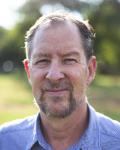
Mark McCaffrey
WHAT: A Skeptical View of Climate Change Skeptics: Confronting the doubt, delay and denial that have prevented us from having an adult conversation about climate and energy
Mark McCaffrey contended we need to respect the science of climate science so we can “have an adult conversation” about the issue of global warming and other climate change issues.
WHO: Mark McCaffrey, Director, National Center for Science Education Climate Initiative
WHEN: 7:30pm, Wednesday 11 April 2012
WHERE: Café Valparaiso, Albany, CA
ONLINE: Here
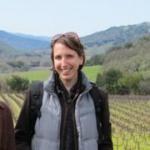
Minda Berbeco, Ph.D.
WHAT: Climate Change from the Biotic to the Exotic
November’s SkepTalk provided the perfect opportunity to introduce to the Bay Area Skeptics the newest member of the NCSE family, Dr. Minda Berbeco.
As their new Programs and Policy Director, Dr. Berbeco works to defend science education in the United States using experience she has culled from a career investigating the effects of climate change on terrestrial systems. Her investigation of the unexpected and unusual effects of climate change on biological organisms was the focus of her talk this month for the BAS.
Dr. Berbeco began her presentation by surveying the audience about their knowledge of the effects of global climate change. Answers included such things as extreme weather, the endangerment of wildlife, a rise in global sea levels, etc. After pointing out how the audience’s feedback suggested a good working knowledge of the effects of global warming, as well as the disparate areas of concern, Dr. Berbeco announced that she would concentrate her talk on a few specific examples through which she hoped to reveal some of the key concerns scientists are attempting to investigate.
One of the most impressive aspects of Dr. Berbeco’s talk was her ability to tie difficult scientific ideas to everyday issues that people might be better able to relate to than mathematical formulas or large charts with temperature readings. Chief among these was her discussion of the effects of global climate change on wine. She began by asking for a volunteer from the audience to taste a glass of red wine and report the flavors she or he experienced. Never one to pass up a free glass of vino, our own David Almandsmith jumped into action. After taking a generous sip, David described the wine in impressively specific ways, including “tartness of persimmons, cinnamon,” and “relatively dry.”
Dr. Berbeco used David’s description to illustrate that many of the aspects of our food that we enjoy the most, wine included, is the result of the climates in which they are grown. Even slight alterations in weather can change these climates in ways that dramatically affect our food’s taste, smell, appearance, and even nutritional value. For vineyard owners, this part of the “terroir” (aspects of where the grapes are grown, such as geology, geography, and climate) can mean the difference between an award-winning crop, and bankruptcy.
As an example, Dr. Berbeco discussed tannins, a diverse group of chemical compounds in wine that can affect color, aging ability, and texture. They cannot be tasted or smelled, but can be “felt” as the tactile experience wine connoisseurs refer to as “dryness.” These decrease significantly in hotter temperatures, and can dramatically affect the consumers’ experience of many wine varieties. Also of concern is the fact that sugars increase as temperatures rise, making formerly mild wines taste sweeter. Perhaps even more alarmingly, some climate changes negate plants’ natural ability to ward off insets, putting entire crops at risk, and increasing the need for chemical pesticides.
Dr. Berbeco went on to explain that the impact of global climate change isn’t limited to flora. Animals are also affected in some pretty dramatic ways, particularly those who live in the ocean. In a short video, she explained that over 30% of the carbon pumped into the atmosphere is absorbed by our oceans, creating a cascade effect that leads to an increase in ocean acidification. Even slight changes in Ph balance can lead to some pretty nasty disadvantages. Sea snails, for instance, use their sense of smell to tell them when predators are in the area, at which point they harden their shells in defense. In a more acidic environment, they can lose this ability, leading to a very happy population of crabs, but a severe increase in the things that sea snails normally eat, including algae, dead fish, etc.
Another example Dr. Berbeco provided was clownfish (yes, the Nemo variety). Scientists have found that they are particularly sensitive to elevated levels of carbon dioxide while in the “settlement-stage larvae” phase of their development . As they float around, deciding on which sea anemone to inhabit, they use odors in the water to decide which real estate to claim. These odors do two things for them. First, it helps them choose an area with fewer predators. And perhaps equally important, it assists them in avoiding any area that is near their parents, thus decreasing the likelihood of incest. In a higher CO2 environment, they lose this ability and actually become attracted to their parents’ scent instead. Aside from the emotional reaction most people have to that little factoid, anyone with a high school level understanding of biology knows what sort of havoc such a change would wreak upon the clownfish gene pool.
In the end, those of us who do our part to increase awareness of global climate change, and who try our best to cut back on activities that contribute to polluting the environment, can also proudly boast that we are helping to secure a future full of good wine, well protected sea snails, and incest-free clownfish. I’ll leave it to the rest of you to dream up the bumper sticker for that one.
WHO: Minda Berbeco, Ph.D. Programs and Policy Director, National Center for Science Education
WHEN: 7:30PM Wednesday 14 November 2011
WHERE: La Peña Lounge, 3105 Shattuck Avenue, Berkeley
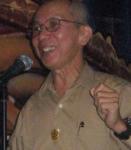
Yau-Man Chan
WHAT: A Unicorn in Your Tank: Magic Tablets That Won’t Improve Gas Mileage
Most of us have seen ads for questionable pills, liquids, and powders that promise to give our bodies an extra advantage. Whether it be weight loss, immune system boost, fuller, thicker hair, or younger looking skin, there’s a quick fix being sold for it. In today’s economy, youthfulness and good health are joined at the top of our panic list with a new concern: better gas mileage. But don’t worry! There’s a quick fix for that, too! Or is there?
This topic was addressed at the October 12th, 2011 SkepTalk by our own Yau-Man Chan, scientific instrument engineer, Skeptiblog author, and star of “Survivor Fiji” in a discussion of the bad economics (and even worse chemistry) of automotive snake oil.
Yau-Man began his talk by introducing us to a product called EnviroTabs®, sold as “an organometallic metal conditioner that acts as a burn-rate modifier that catalyzes fuel.” In short, its makers claim that EnviroTabs® improves fuel economy, saving you money. Using it is simple; just drop a tablet into your tank on each fill-up, and you’ll average 10%-20% better gas mileage. That’s the claim made on their web site, anyway, and the sort of thing that deserves some scientific investigation. Luckily, Yau-Man provided it.
First, as Yau-Man pointed out, it’s telling that EnviroTabs® is sold via multilevel marketing (MLM), a marketing strategy in which salespeople are compensated for selling the product and also for creating a downline of other distributors by recruiting new salespeople into the sales hierarchy. Why, Yau-Man asked, use this sort of strategy? Since gas prices are so high in the U.S., and are even higher in other countries, why would the makers not simply sell their product on the open market? Although their marketing strategy says nothing about the efficacy of the product, it does raise suspicions.
The engineering of modern automobile engines is as competitive as it is complex. As Yau-Man pointed out numerous agencies, from the California Air Resources Board to the Environmental Protection Agency, put pressure on car manufacturers to lower emissions and to improve gas mileage as much as possible. Numerous gasoline additives, the addition of microcomputer Engine Control Units, and various other technological achievements have improved the internal combustion engine greatly over the past several decades, and have been hailed as wondrous scientific achievements. Any additive that improves gas mileage as much as EnviroTabs® claims to would be a multi-billion dollar industry, and one highly sought after. Multilevel marketing would simply slow down the distribution process to a snail’s pace, not to mention being completely unnecessary.
As for the actual science behind EnviroTabs®, the picture is rather bleak. A number of professional organizations and industry insiders, including the AAA, Consumer Reports, Popular Mechanics, the EPA, the Federal Trade Commission, and even Click and Clack (of NPR’s “Car Talk”) say that gasoline additives do NOT work. The EnviroTabs® website offers little useful scientific information, and a great many confusing statements. For instance, they claim that their product “changes the surface heat absorption characteristics of metal,” but then also state that it “works with all types of fuels,” including diesel, even though a diesel engine is compression-based only, and produces very little heat.
Yau-Man ended his talk with the following 2006 statement by Texas Attorney General Greg Abbott about a product making similar claims called BioPerformance®: “BioPerformance claims its top-secret gas pills can save consumers big bucks at the gas pump. These claims are bogus; the pill does absolutely nothing to improve gas mileage. The company is merely a smokescreen to trigger the recruitment of more and more paying members into what appears to be an illegal pyramid scheme.” One year after being shut down by Attorney General Abbott, BioPerformance® returned, and began its multi-million dollar company after paying the state of Texas several million dollars in fines, and agreeing to stop making claims that were unsupported by science.
The future of EnviroTabs® is uncertain, but one thing is clear. The only good defense against being taken in by snake oil salesmen is to rely upon critical thinking and the scientific method to evaluate such claims.
WHO: Yau-Man Chan, Member of the Bay Area Skeptics Board
WHEN: 7:30pm, Wednesday 12 October 2011
WHERE: La Peña Lounge, 3105 Shattuck Avenue, Berkeley, CA
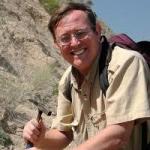
Don Prothero, Ph.D.
WHAT: Catastrophes!
As our family story goes, when my parents left eastern Oklahoma for California (the first in their families to move that far away in generations), many of their relatives bid them farewell with a sense of foreboding, quite certain that they would someday soon perish in a terrible earthquake. This may seem odd coming from people who dealt regularly with tornadoes, but it’s an opinion that persists to this day in many parts of the country, and demonstrates a sentiment which is returned with alacrity by people who can’t imagine living with the seemingly constant threat of deadly twisters known all too well by Oklahomans.
Last night’s talk by Dr. Don Prothero, professor of Physical and Historical Geology, Sedimentary Geology, and Paleontology at Occidental College, brought this family lore back to me. His talk, entitled “Catastrophes” and given at Café Valparaiso in Berkeley, assured me that my relatives were not alone in their tendency to oversimplify their threat evaluation of natural disasters. Prothero provided many detailed examples of death and destruction caused by a wide variety of nature’s hazards, and pointed out some facts that challenged my own thoughts about them. For instance, many of us are aware that The Great 1906 San Francisco Earthquake resulted in approximately 3,000 deaths with its subsequent fires leveling much of the city, but fewer know that the largest quake in North America was actually the 1812 New Madrid Earthquake, whose epicenter was in an area that is now part of Missouri. It was felt over an area of approximately 6,000 square miles, ringing bells and toppling steeples from Canada to Mexico, and as far east as Boston.
Earthquakes are not the only natural disasters, of course, and they’re not even the most deadly. As Prothero pointed out, the worst natural disaster in American history was actually the 1900 Galveston Hurricane in Texas which killed over 12,000 people (by contrast, the more recent Hurricane Katrina claimed 1,800 lives). Even more threatening to human life was a volcanic event known as the Toba Supereruption which took place in what is now Indonesia over 70,000 years ago. It claimed all but a few thousand breeding pairs of humans, creating a bottleneck in human evolution that almost spelled the end of humanity; the dramatic effect of that event can even be found in the genetic code of human parasites! Now that, my friends, is what you call “a close one.”
Volcanoes have done their fair share of damage in more recent times, as well. Prothero told, for instance, of the 1815 eruption of Mount Tambora on the island of Sumbawa, Indonesia, which sent so much ash into the planet’s atmosphere that it lowered global temperatures between 0.4 and 0.7 °C (0.7–1.3 °F), resulting in major food shortages, as well as what has become known as The Year Without a Summer. (On a more positive note, the resulting bad weather confined British novelist Mary Shelley indoors at Lord Byron’s summer residence on Lake Geneva so long that, out of sheer boredom, she would sit down and write a short story that would eventually become Frankenstein.)
Today, much of the world has worked to become far more prepared than earlier civilizations to handle the aftermath of large scale natural disasters, but Prothero cautions us to keep things in perspective. In the grand scheme, famine, infectious diseases, and even such mundane events as lightening strikes are a much bigger threat to us than natural disasters. In fact, you have a greater chance of dying from a snake bite this year than dying in an earthquake. And surprisingly, nearly 40% of the deaths from natural disasters will be due to severe weather (e.g., snowstorms) and extreme heat/drought, two natural event categories most people never even consider.
In the end, the message Dr. Prothero left us with last night was this: Stay educated about how to respond to natural disasters, and support efforts to keep ourselves as safe as possible in such events, but be aware that most of us will die from heart disease, cancer, stroke, infections, and car accidents. So rather than spending another sleepless night worrying that Mother Nature may throw you a curve ball, a better use of your efforts might be to cut down on the hamburgers, monitor your physical health, and wear your seat belt.
——————
Sheldon W. Helms, associate professor of psychology at Ohlone College in Fremont, CA, is a dues-paying member of the Bay Area Skeptics, and serves on its Board of Directors.
WHO: Don Prothero, Ph.D. Professor of Physical and Historical Geology, Sedimentary Geology, and Paleontology at Occidental College
WHEN: 7:30PM Wednesday 14 September 2011
WHERE: Café Valparaiso, Albany, California

[…] take on Halloween and culture when she was still at U.C. Berkeley. (She also gave a SkepTalk for the Bay Area Skeptics back then.) ¿But what about the candy? Nothing good (except the joy of indulgence). […]